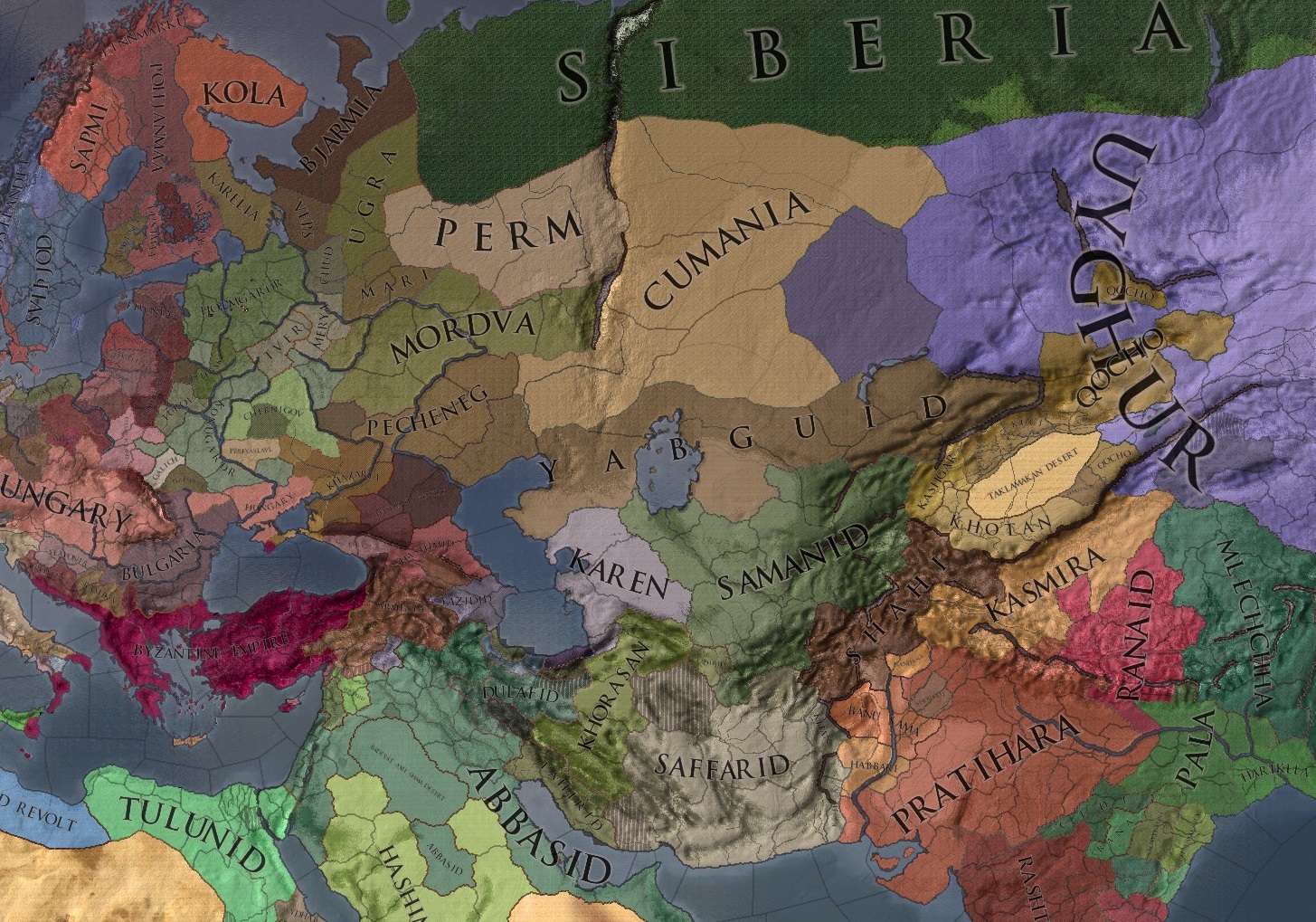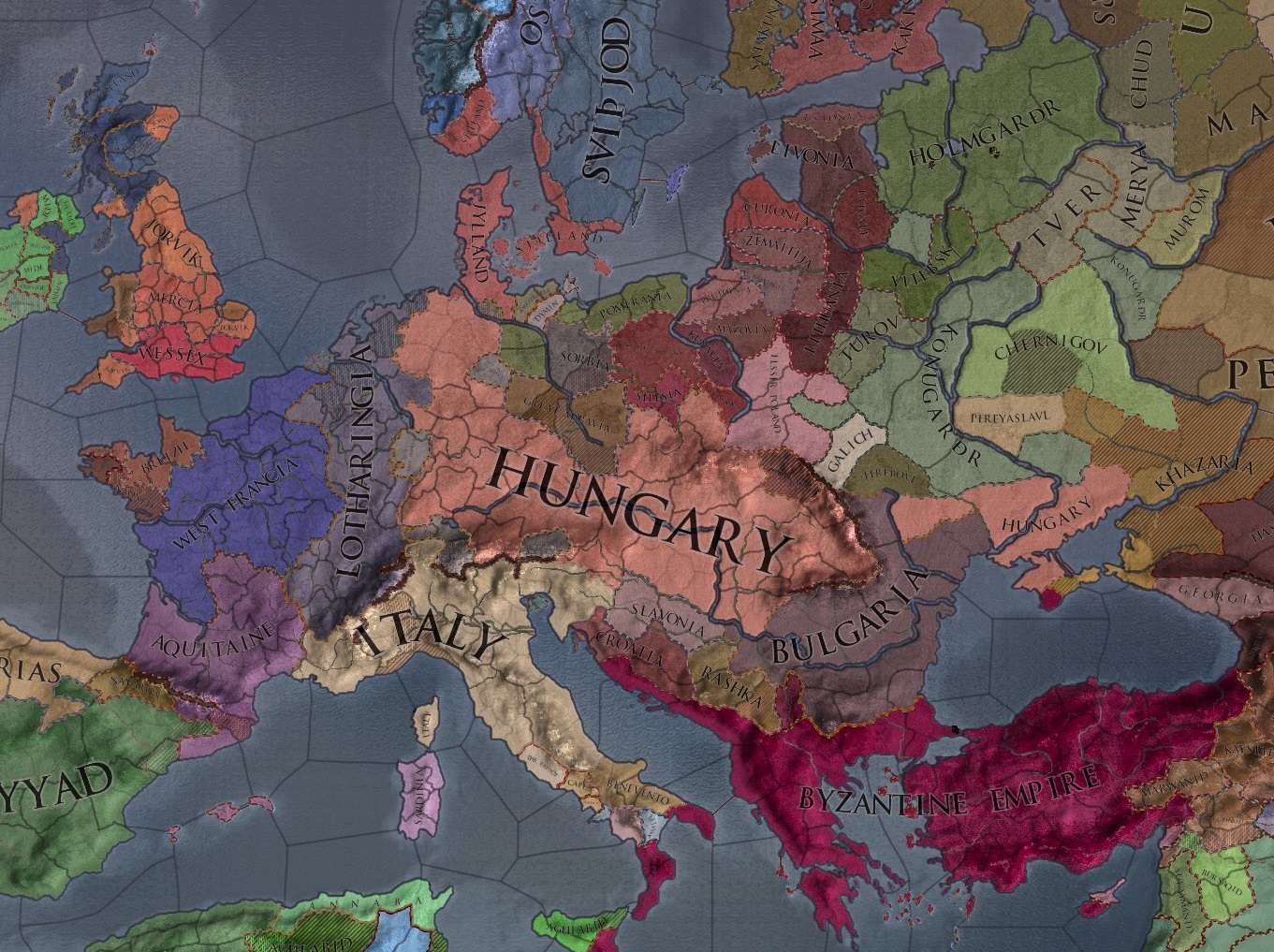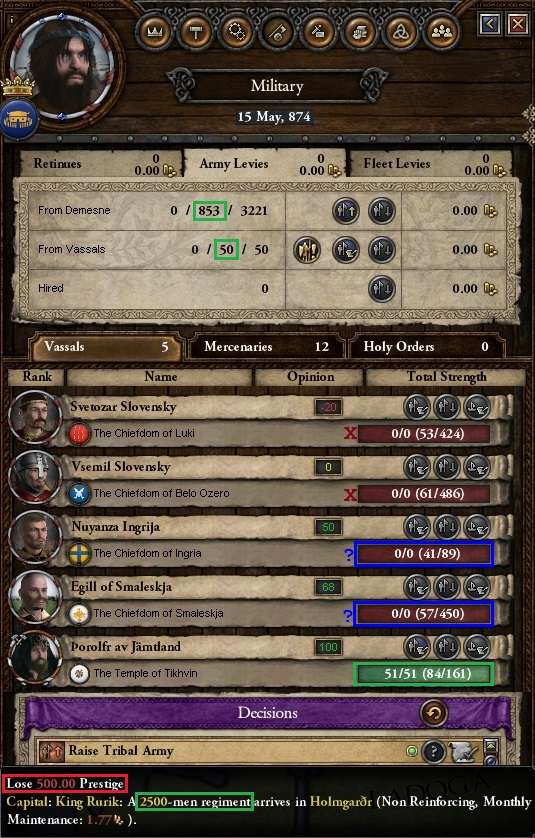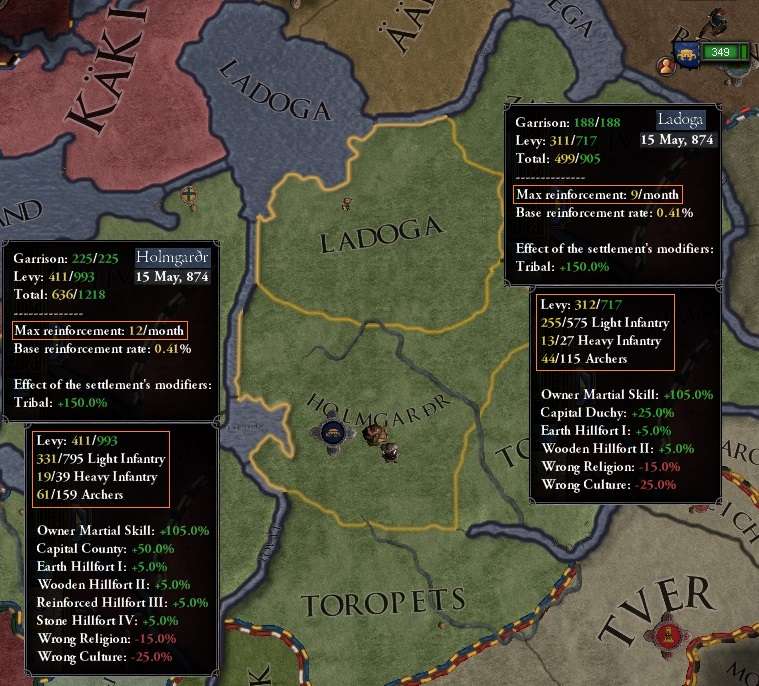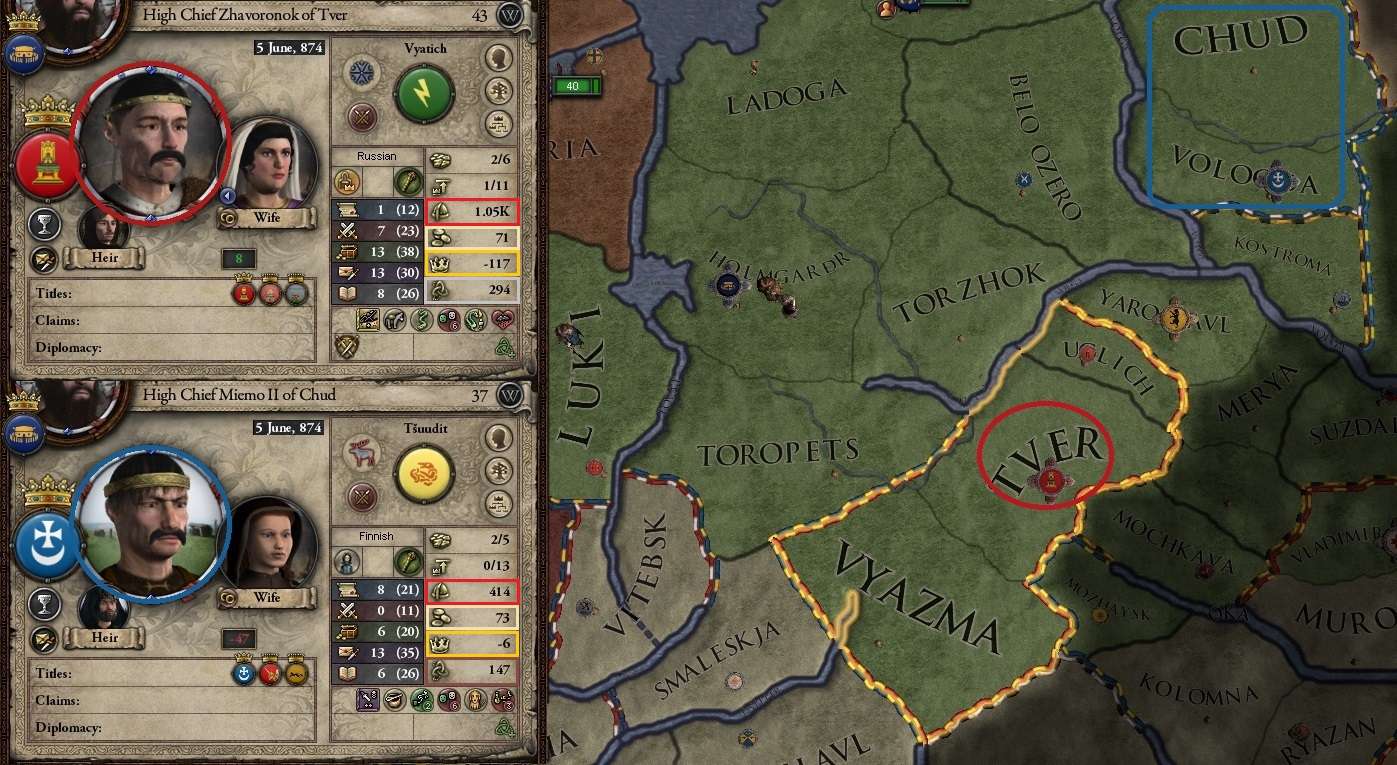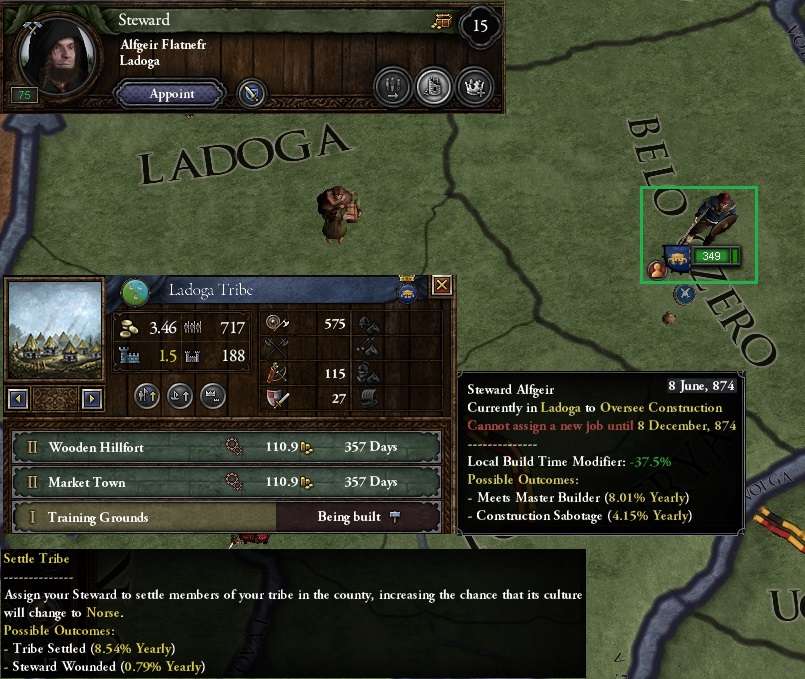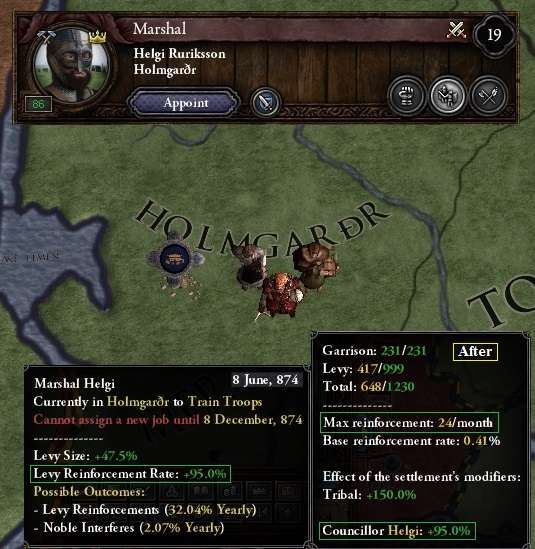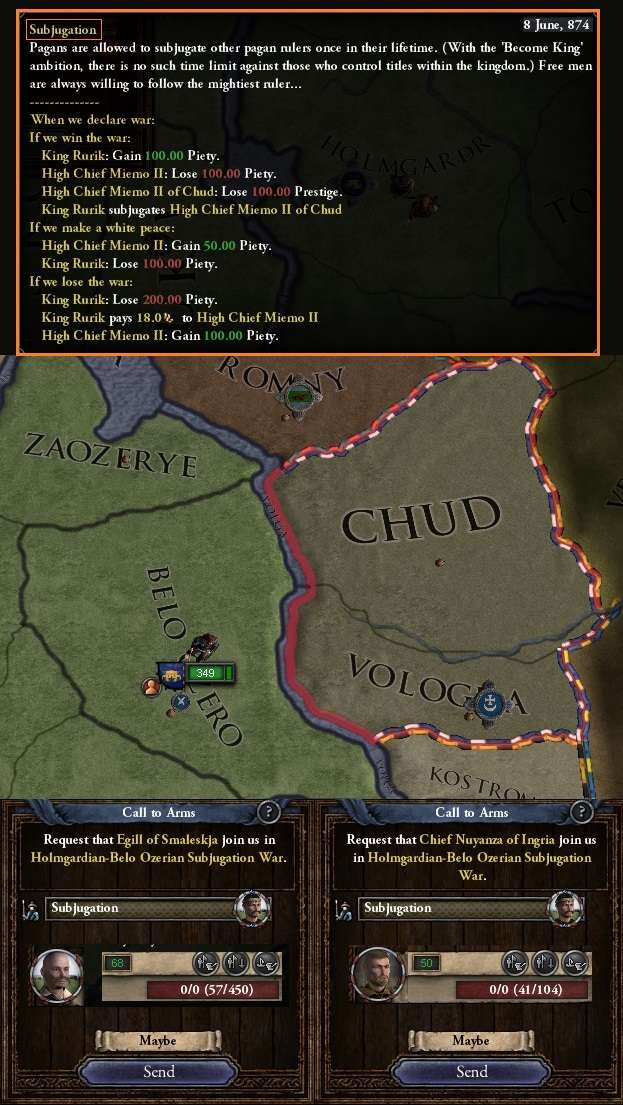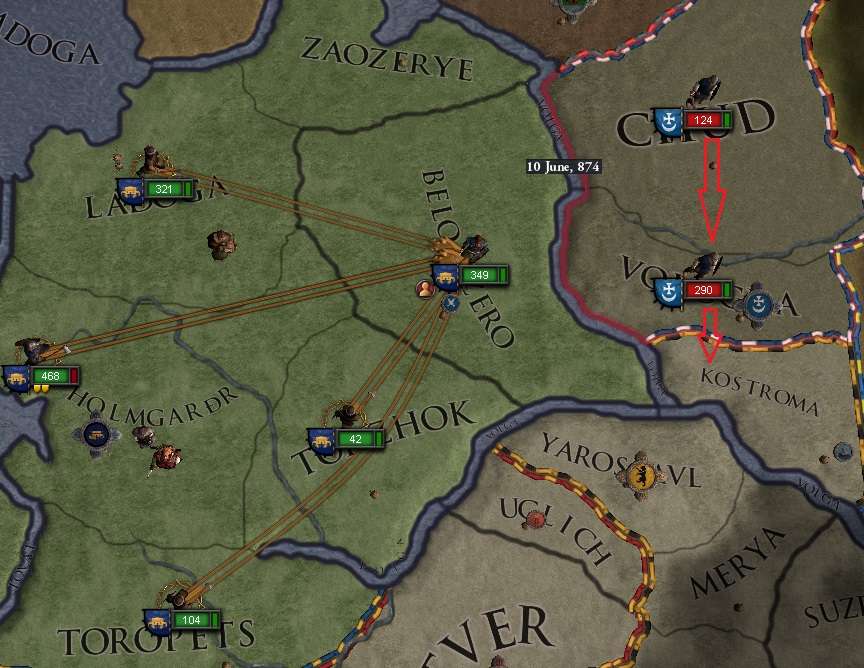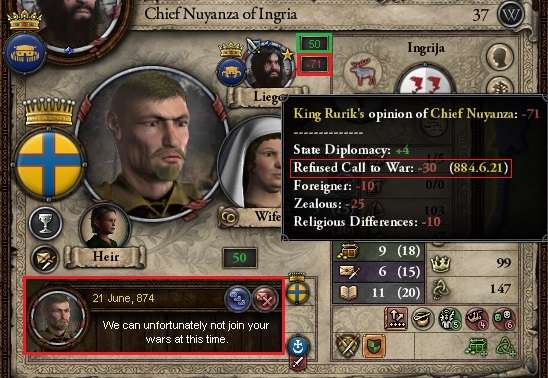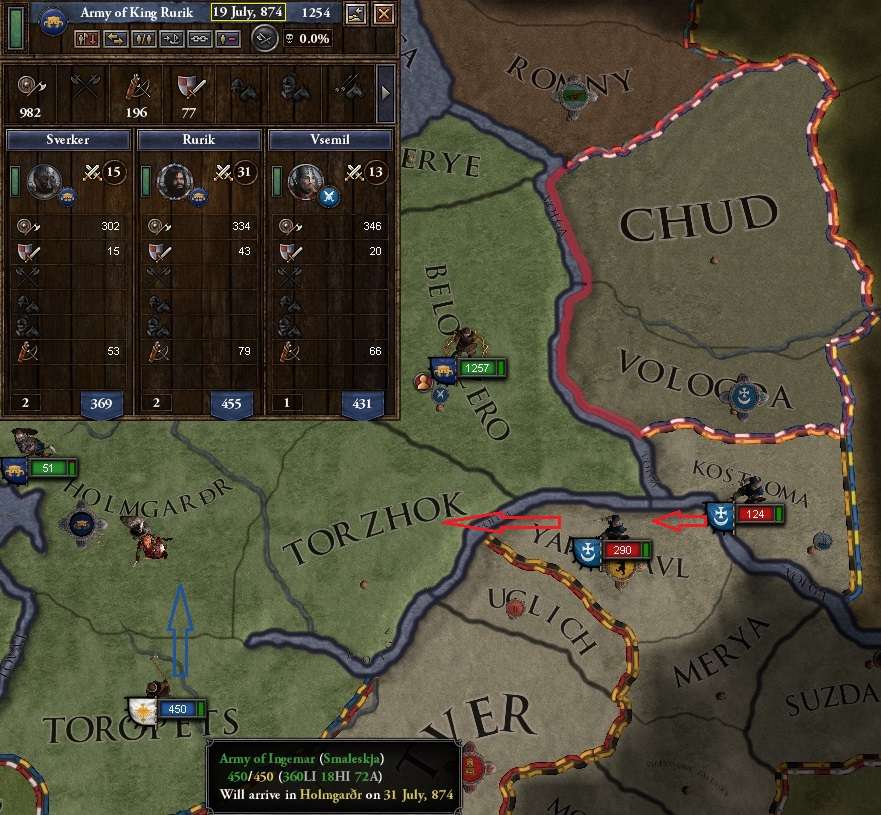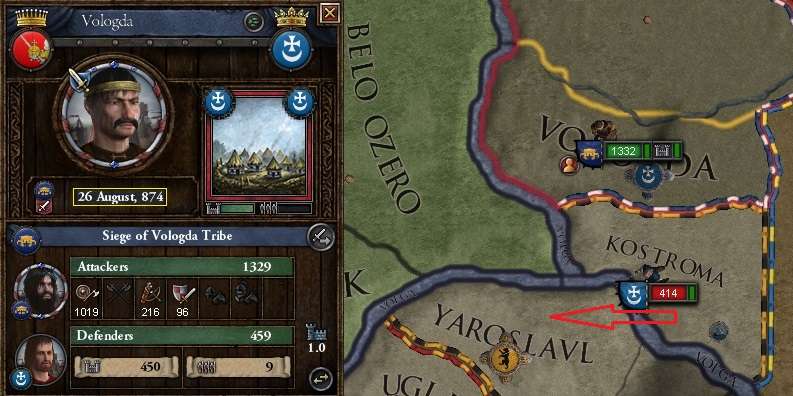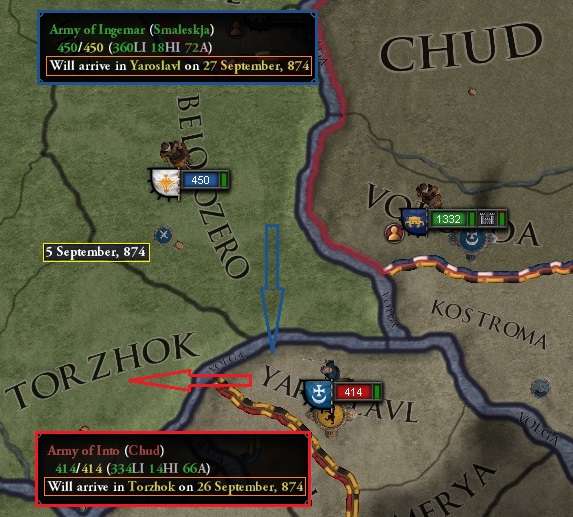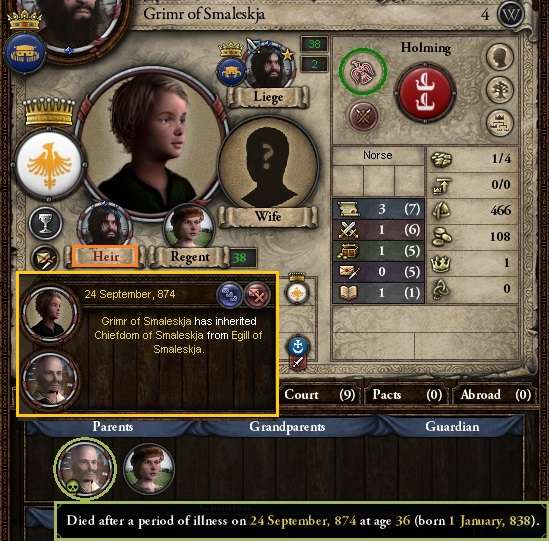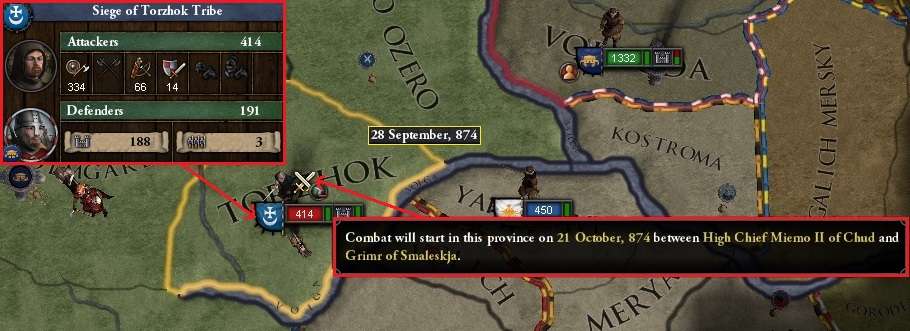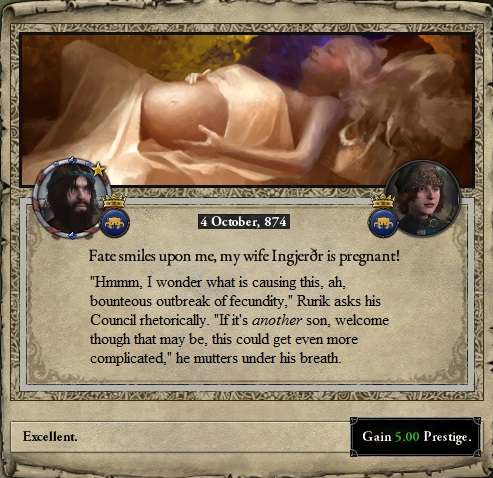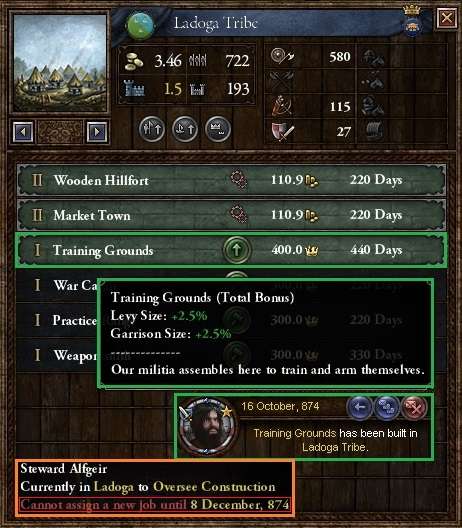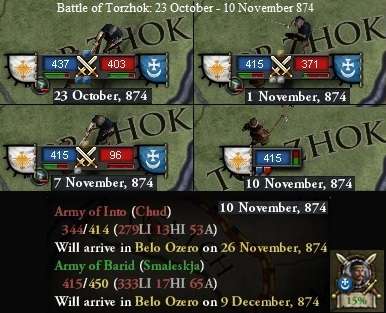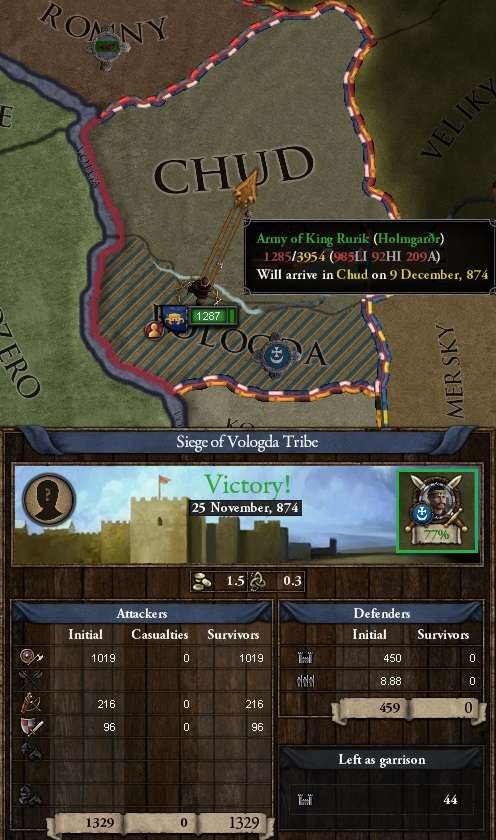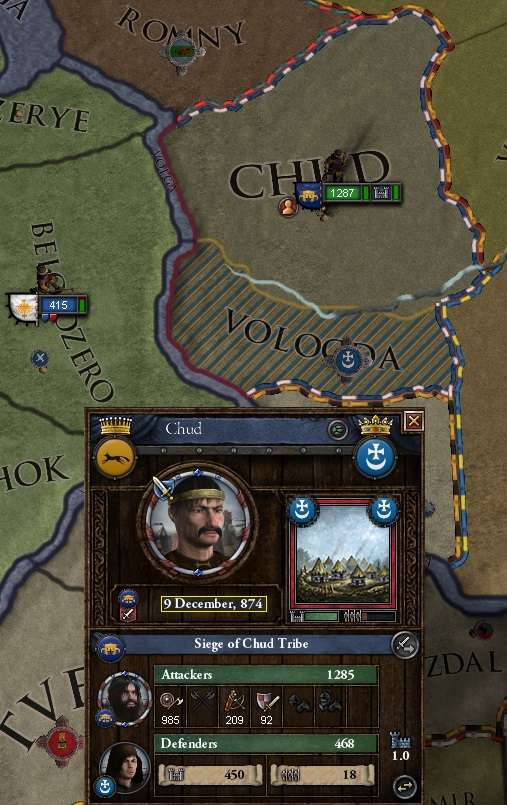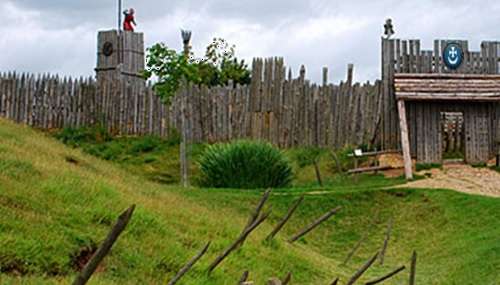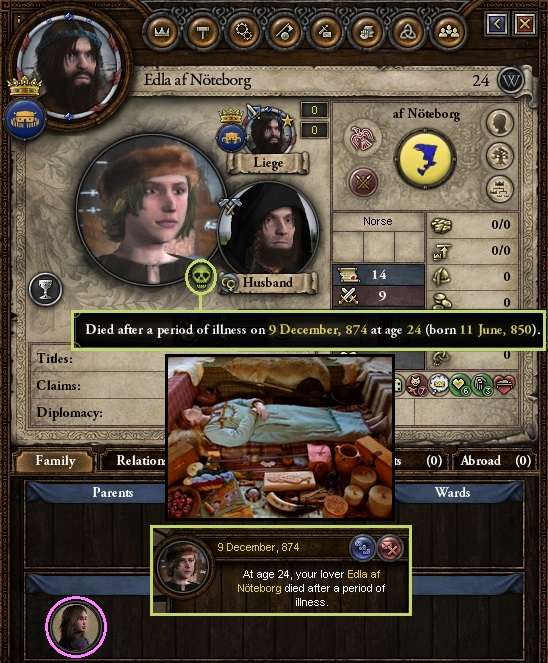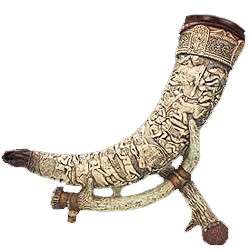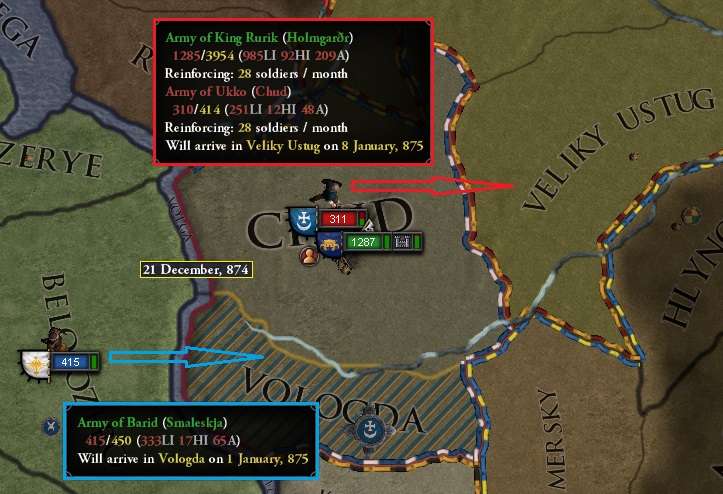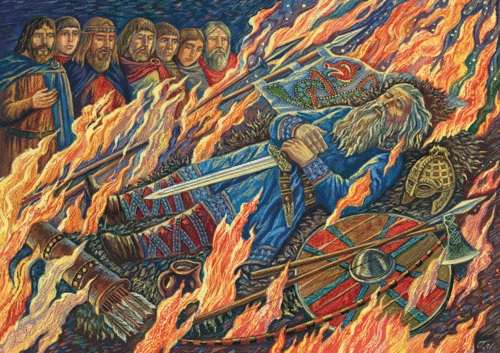Chapter 17: Blood on the Ice (16 August 873 to 15 May 874)
Chapter 17: Blood on the Ice (16 August 873 to 15 May 874)
We resume the story with Rurik back in his seat of Nygarðr with the veterans of his remaining personal guard from January 867 [ie the original 676 event troops], contemplating whether to raid again or conquer for Rus, and if he should use much of his remaining prestige to call up a tribal army.
16 August 873
As Gumarich der Schreiber noted in his commentaries, no-one had long to wait.
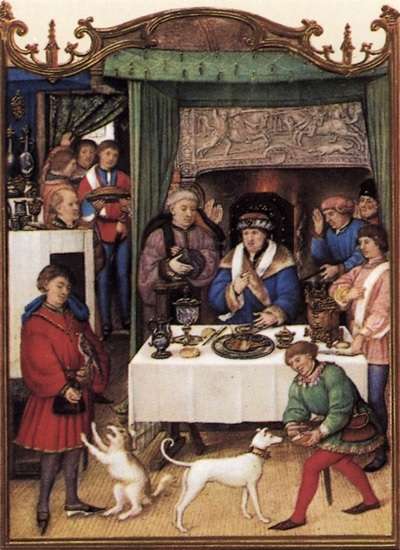
Plenty for all. "Here, Hunter!"
We know from her diary that young Edla was too unwell to attend either the celebratory feast or the king’s chamber that night. Perhaps mercifully, the dusty records do not reveal whether Rurik spent that night alone or not. There is always a chance that Queen Ingjerðr may have returned around this time for one of her periodic visits home, but that is unclear from the chronicle.
September 873
The month began with the arrival of Rurik and his personal regiment [ie those remaining original event troops] in Ladoga and the issue of a declaration of war to his northern neighbour, the Finn Karhu of Veps. The simple goal is the conquest of Zaozerye, part of the Rus claim.
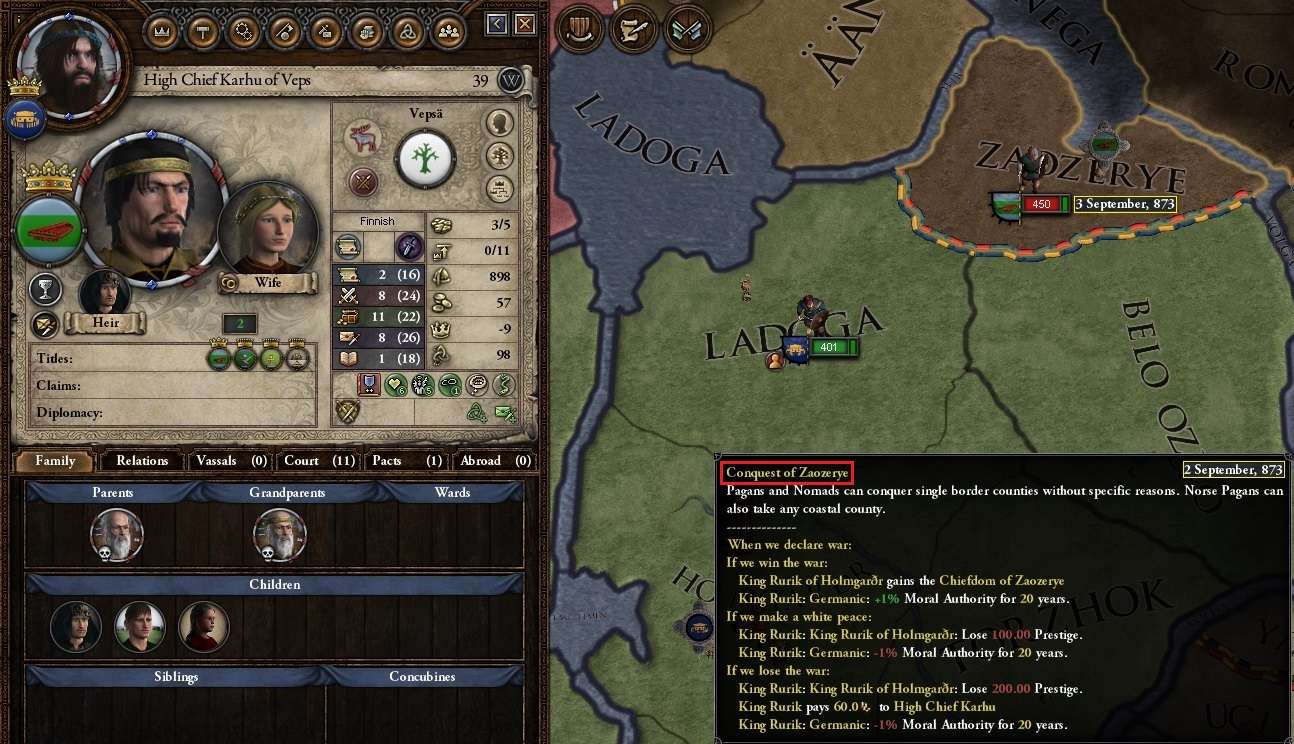
The precaution of having the regiment in place was apposite: the enemy’s levies appeared instantly after the declaration. And of course, Rurik summoned his at the same time. For this small campaign, he simply planned to use his own demesne levies. The call for vassal levies and a possible tribal army would be contemplated later, if needed.
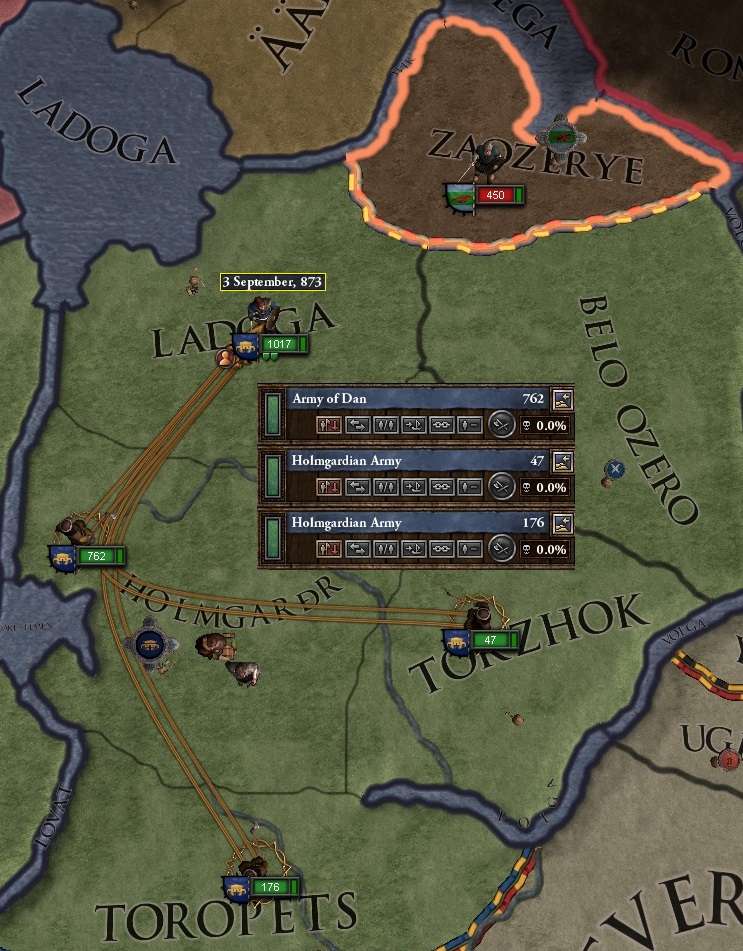
Perhaps Ingjerðr did return for a visit a little while earlier … we shall never know [ie. I’m not going to keep contriving elaborate narrative twists to explain these long-distance conjugal goings-on any more ].
].
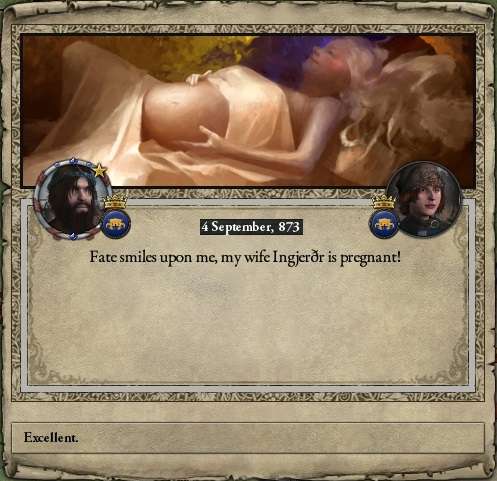
With the Ladoga levy assembled, at reasonable levels and joined with the King’s Regiment, on 13 September Rurik orders a march on Zaozerye, where Karhu’s local commander Voitto immediately runs north to Romny. A wise move on his part.
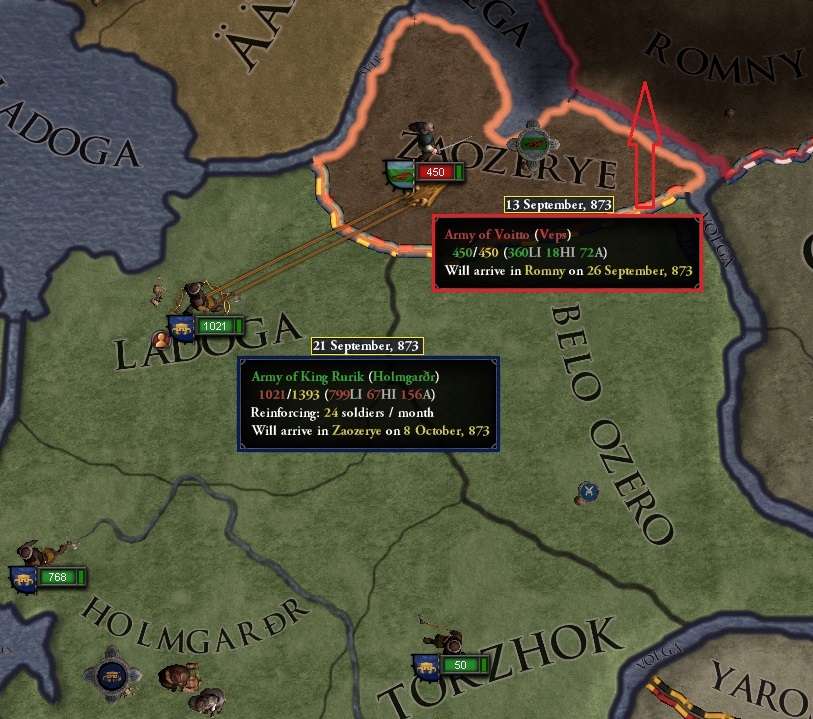
27 September brings the news that key commander Sverker and his wife Bodil have had a son, named Sörkver. It is hoped he will grow up to be a strong Norse warrior! By the next day, the enemy have vacated Zaozerye, while Rurik is still at least ten days away.
October 873
Dan arrives in Ladoga on 7 October with the main Nygarðr Regiment levy (774 troops) from the home county of Holmgarðr. He is ordered to march straight on to Zaozerye, a good central point from which to view the enemy’s next moves (if any), while reducing their holding there. Rurik arrives in Zaozerye with the main-guard on 11 October, to find the gates of the tribal holding closed up and the fort entrusted to one of Karhu’s underlings. The siege commences - at least the recent improvement in siege warfare will help speed things along a little. To the north in Romny, Karhu has consolidated his own levy – it numbers 898, enough to earn a measure of respect but not to cause much concern. Unlike the nasty surprise received in Pskov a little while back!
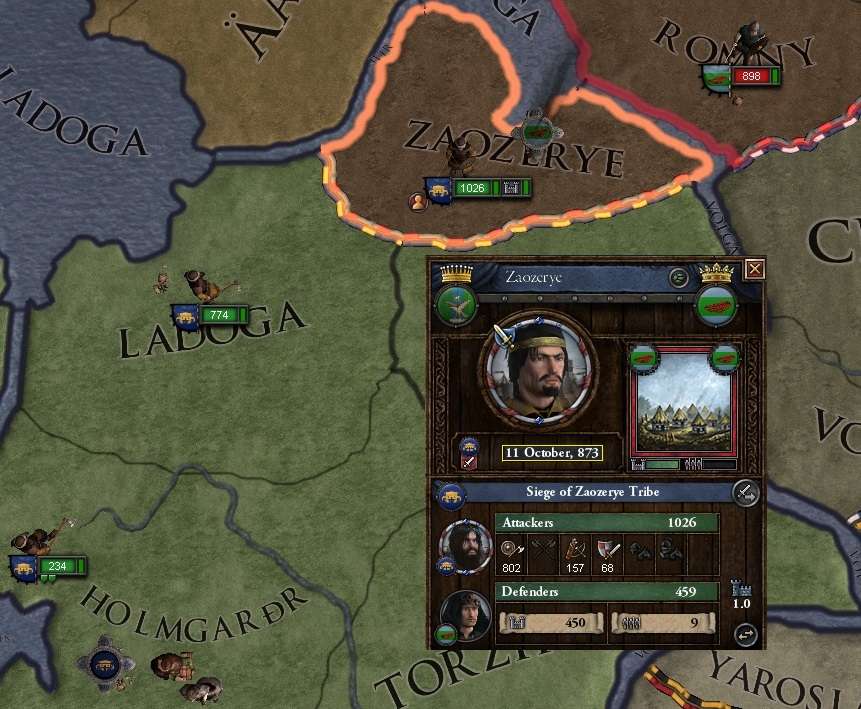
The Nygarðr Regiment arrives in Zaozerye on 31 October, while Voitto takes the Veps army south to Chud, through which Rurik expects them to try to outflank him by crossing the Volga into Belo Ozero. Rurik simply waits for now, while the last of his demesne levies join him in Zaozerye.
“So, they’re scurrying through the territory of our neighbour to attack the women and children of Belo Ozero, eh?” Rurik was heard to remark. “I will not forget that soon. It would be better to have that Chief being more subservient to our interests, I think!”
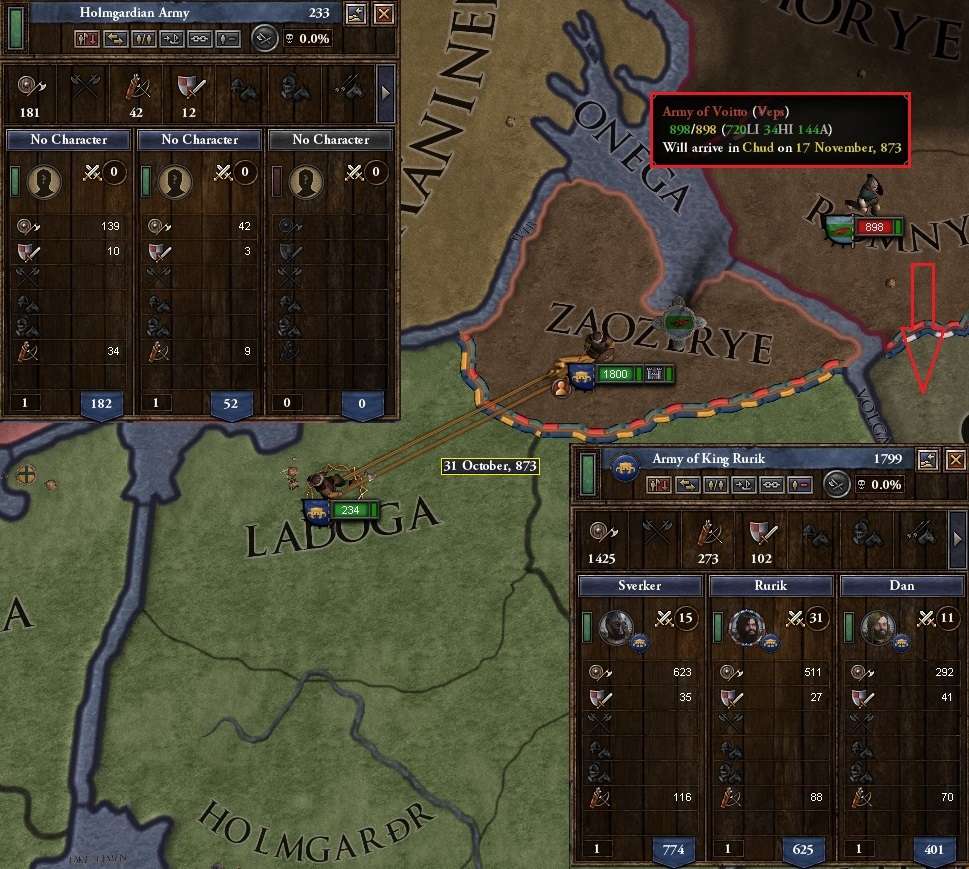
November 873
As another northern winter approaches, the Veps army arrives in Chud on 23 November and, as expected, moves to cross the Volga and attack Belo Ozero. With the need to cross the river, Rurik’s scouts estimate he can get there six days before the enemy, which would put them at the tactical disadvantage. Either Voitta accepts the battle or pulls back, either of which would suit Rurik at this point. He wanted to conclude the siege of Zaozerye before offering decisive battle to Karhu’s forces: deflecting them from home soil for now is the preferred outcome. Helgi is given command of a contingent large enough to stop the Veps attackers (one way or the other), while Rurik remains with a smaller force to continue the siege.
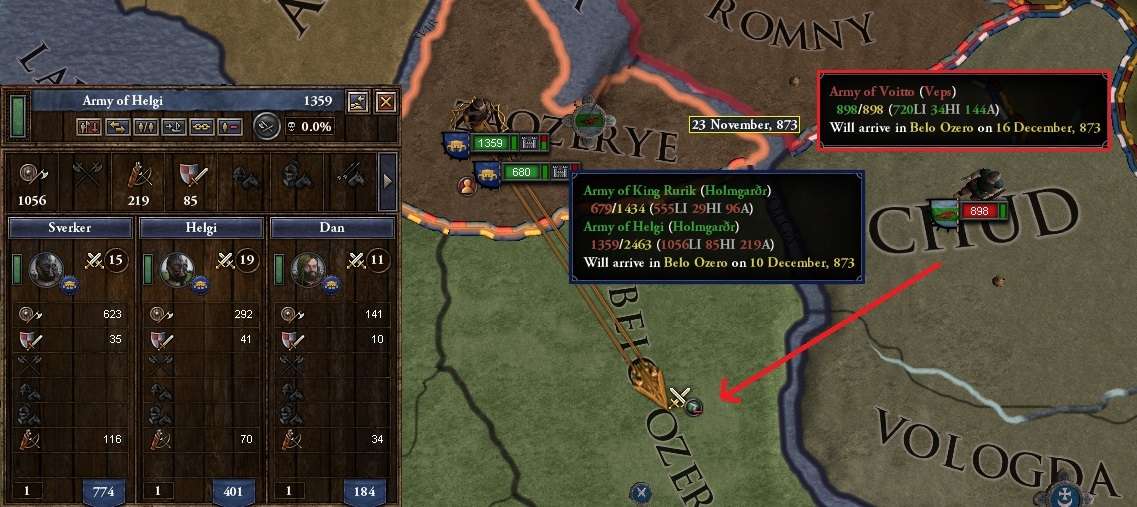
Three days later, Voitto halts his attack and Helgi is likewise halted in Zaozerye, to once more assist with the siege.
December 873
In early December, a report is received from the Queen’s spy network (she continues her work in Constantinople for now). A new plot amongst the courtiers has been discovered. This adds to another reported earlier, about which nothing has been done as yet. Rurik is not sure whether he really needs to worry about these unless they concern someone of interest or value to him. Though perhaps he is missing something he should be paying attention to.
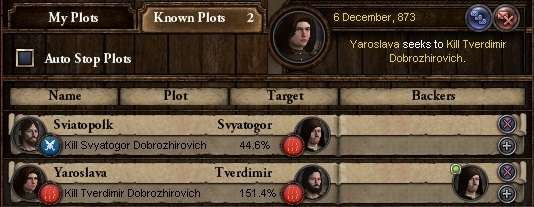

At least it’s a variation on the stab in the back. And if the expression of the victim is anything to go by, it doesn’t even hurt – just a minor irritation! It actually looks like some kind of attempted headache cure by a medieval ‘chirurgeon’: “Here you go, Sire, just relax, this won't hurt a bit. You may feel just a bit of a tickling sensation in your scalp.” "Oh, I say, that seems to be working, I can't feel anything any more ..."
As the depth of winter sets in and the land is blanketed with snow and ice, hygiene in the siege camp leaves much to be desired. Over 180 troops die of disease – a sore loss indeed.
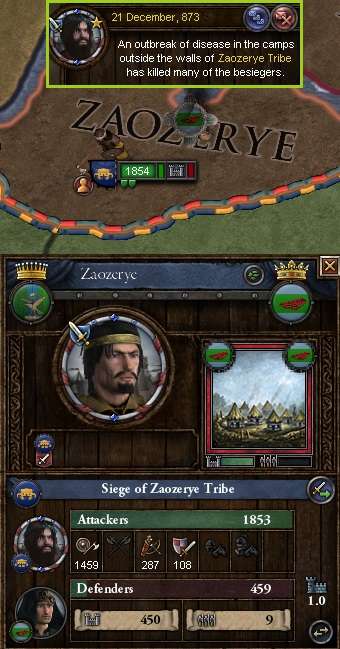

Death dances among the miserable besiegers at Zaozerye in the winter of 873-74.
At this time, Chancellor Hrörekr and Steward Alfgeir come up with a suggestion: as an unintended Christmas present for the depleted coffers and a mercy for a young prisoner who has been held since the Britannia raid, it seems young Tanetbiu now has a monetary value to her father back in Devon. The offer of ransom is made to them by an envoy on the day of their heathen Cristes Maesse (the day is more familiar to Rurik's people as the Roman Saturnalia festival) and accepted (with unbefitting ill-grace) on the first day of the new year – the 874th or their false 'Lord'.
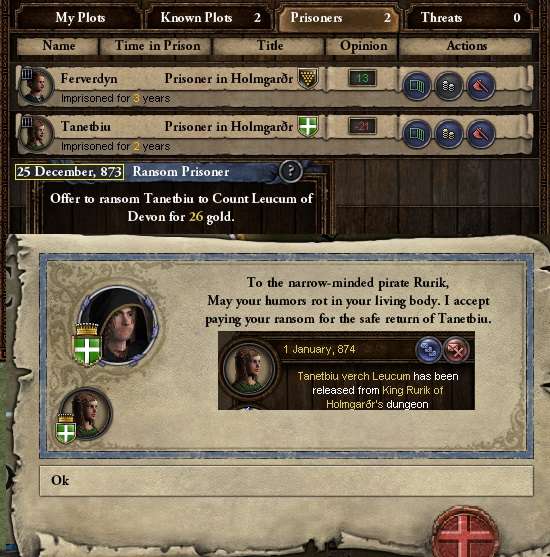
31 December finally brought the fall of the Zaozerye tribal holding [bringing the war score to a healthy 62%]. But more will be required to make Karhu submit. The siege ended up costing 185 soldiers due to disease and another 44 are detailed to garrison the holding. This prompts Karhu’s commander Voitto to again march on Belo Ozero, perhaps for revenge, or at least to take the fight to the Holmgarðians. This time, Rurik sits tight, allowing them to proceed: it now suits his purposes to offer open battle, in the hope of winning a victory in the field to show Karhu the futility of further resistance.
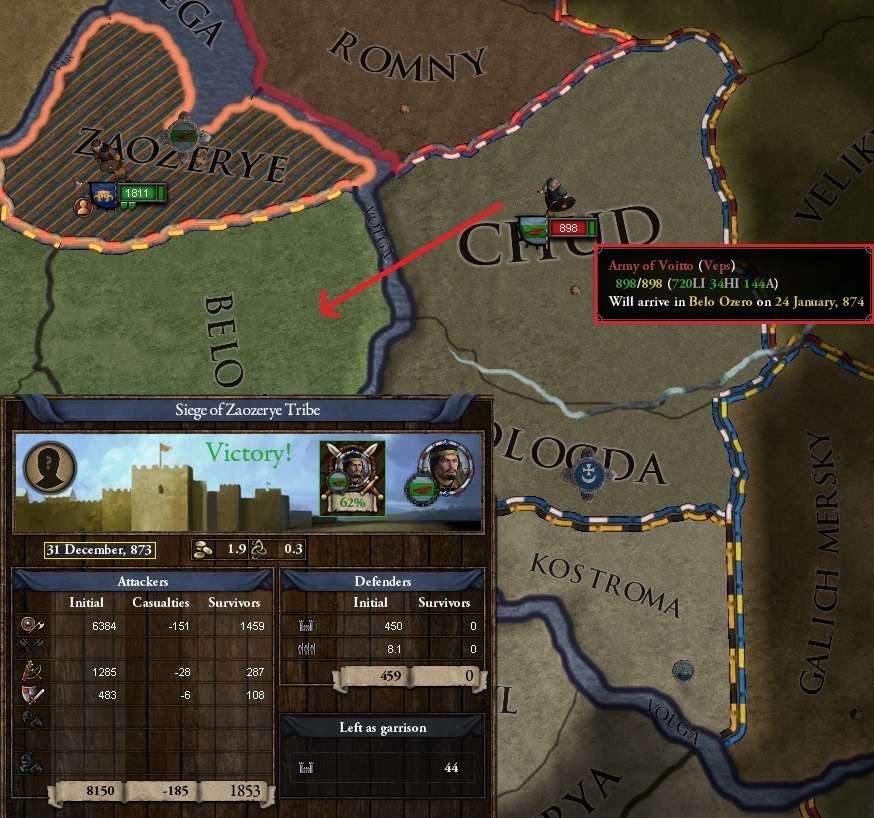
January 874
Voitto’s modest army makes it to Belo Ozero on 24 January. Rurik issues new orders now the enemy is in place and ready for the taking:
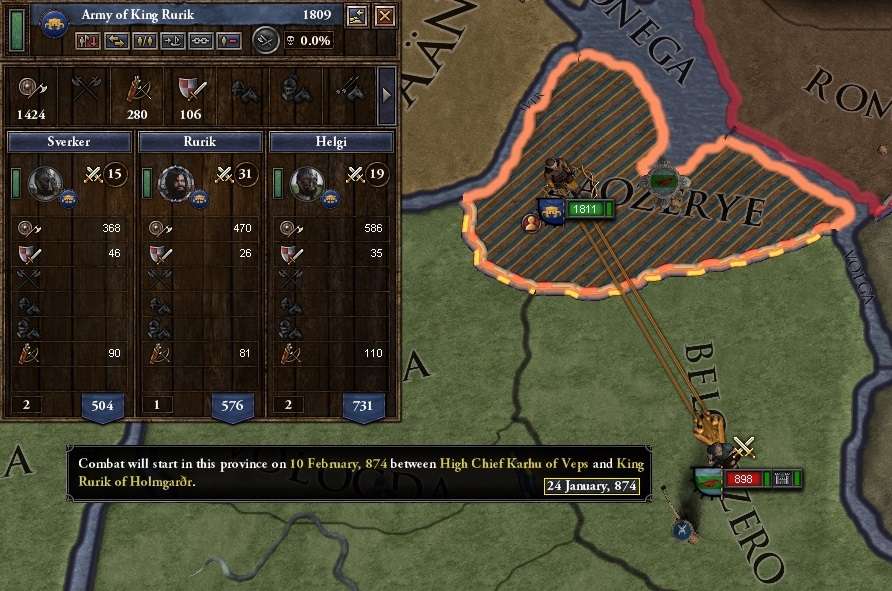
He continues in a lower voice, to his commanders.
February 874
The Battle of Belo Ozero began on 11 February with the usual opening exchange of archery. As the battle wore on, the centre saw the hardest fighting and took the heaviest casualties, Rurik coming up against the strongest enemy division. They returned to exchanges of archery while the two wings then closed on their opposites to melee. "They are close to breaking!”, shouted Rurik, covered in the blood of his enemies and laying about him with Hálsbitr. “Send messages to Helgi and Sverker – press now and we will have them!"

Rurik, Hálsbitr in hand, exhorts his troops onward through the snows at the Battle of Belo Ozero.
Press forward they did and by 27 February the enemy were indeed broken and in full retreat.
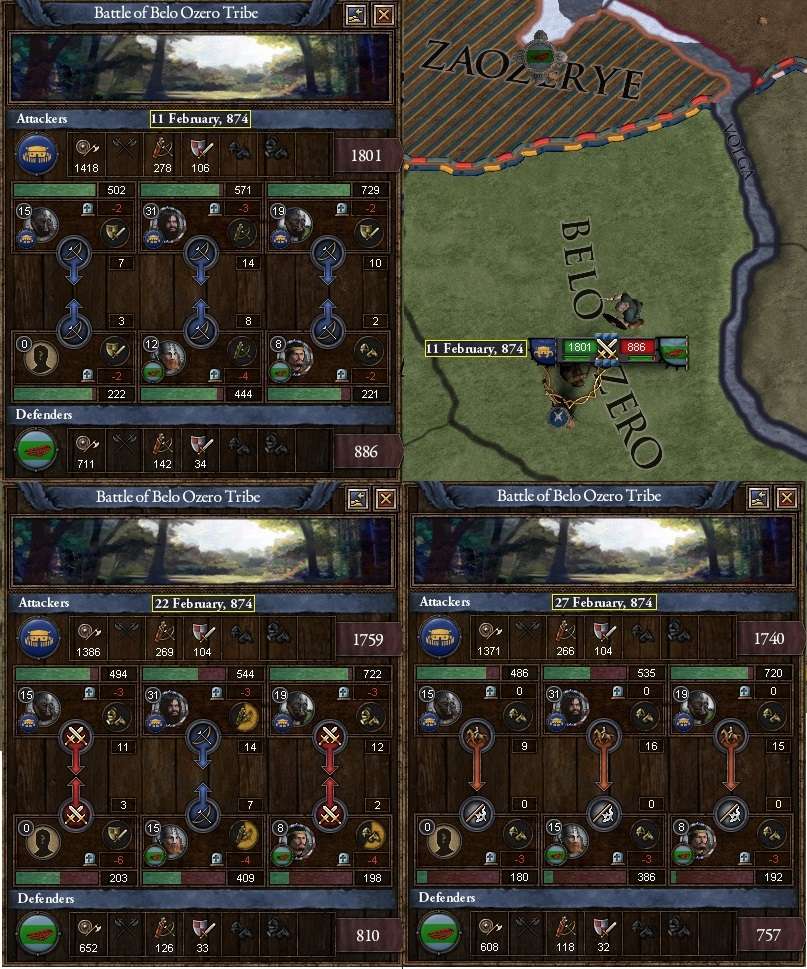
March 874
Victory was marked on 6 March, with the enemy suffering heavy but not fatal casualties. The war was almost won, but still Karhu refused to give up. Very well, he would be forced to yield. Voitto flees back to Zaozerye and will be pursued, with Rurik hot on his heels.
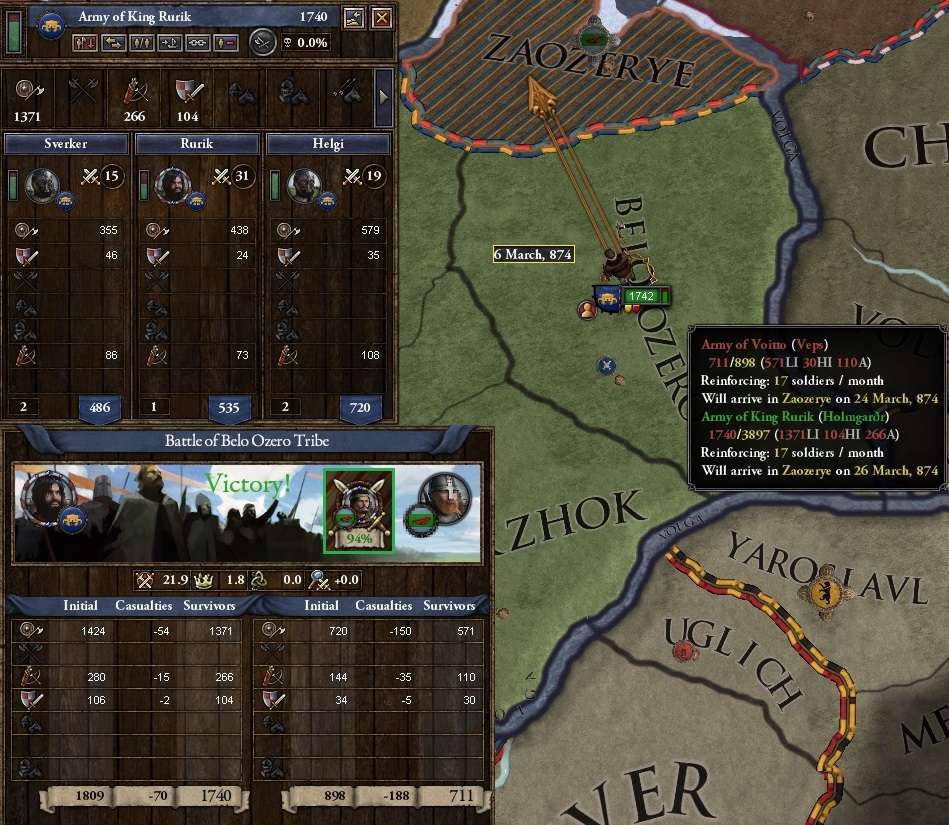
After arriving in Zaozerye, Voitto heads straight back to his starting point in Romny. Rurik gave chase, confident they will not have sufficient time to rally from their rout to make a defence there along the icy banks of the Volga. He is now just one day behind them.
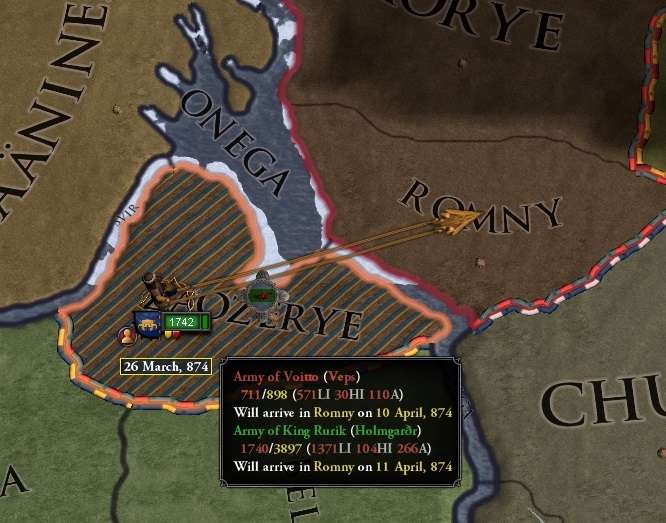
April 874
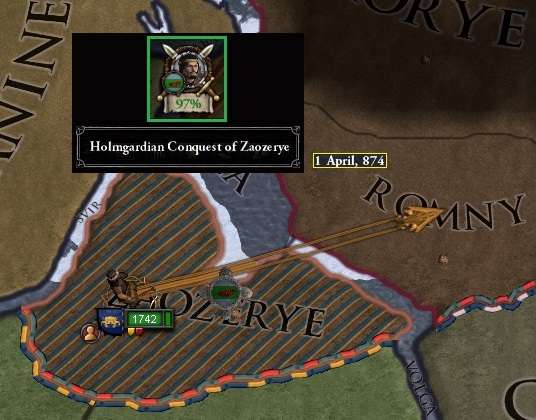
Another message, more welcome, arrives in his dispatches from Nygarðr. Another son! What Helgi makes of all this, and the implications for the gavelkind succession, remains unclear for now – certainly to Rurik. He is more concerned about the present. And probably considers himself immortal, or at least with many more years to come.
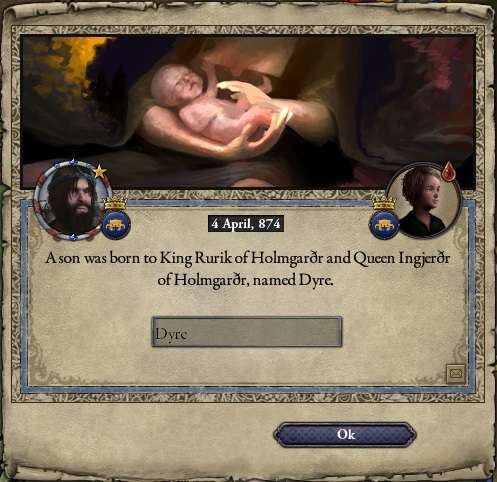
This makes Helgi as heir, plus two sons and two daughters by Ingjerðr. A growing brood to secure the dynasty - and possibly divide the realm in the future!
And Hrörekr sends a message that may have no direct or immediate import for the frozen lands of the north – but sounds like good news if it means members of this particular branch of those Abrahamic infidels now have more chance of fighting each other!
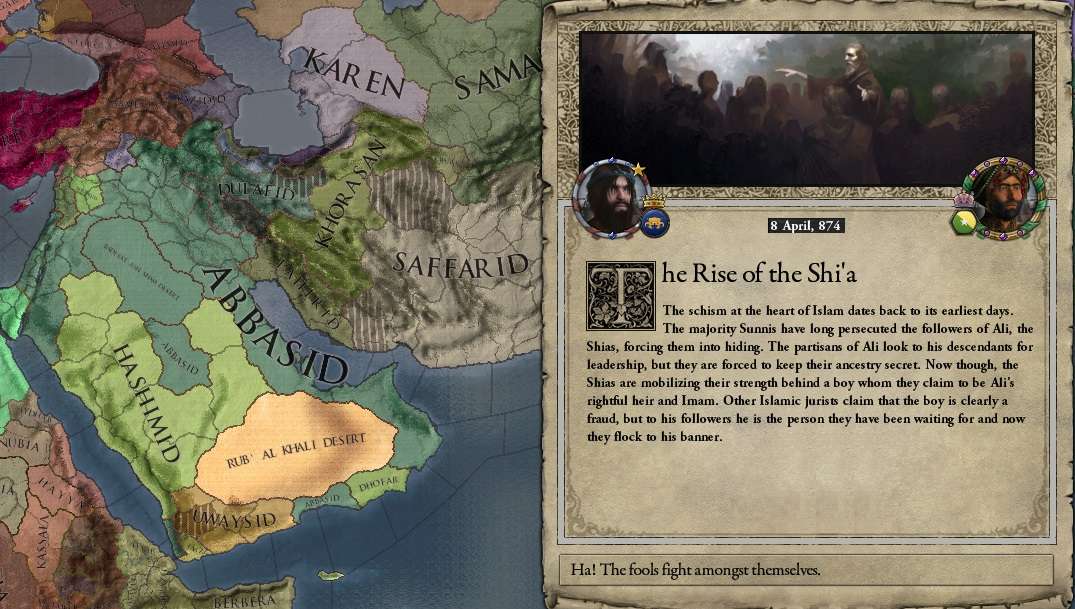
The tracks of the remaining Veps army are still fresh in the snow, heading north to Pomorye, as Rurik arrives in Romny on 11 April.
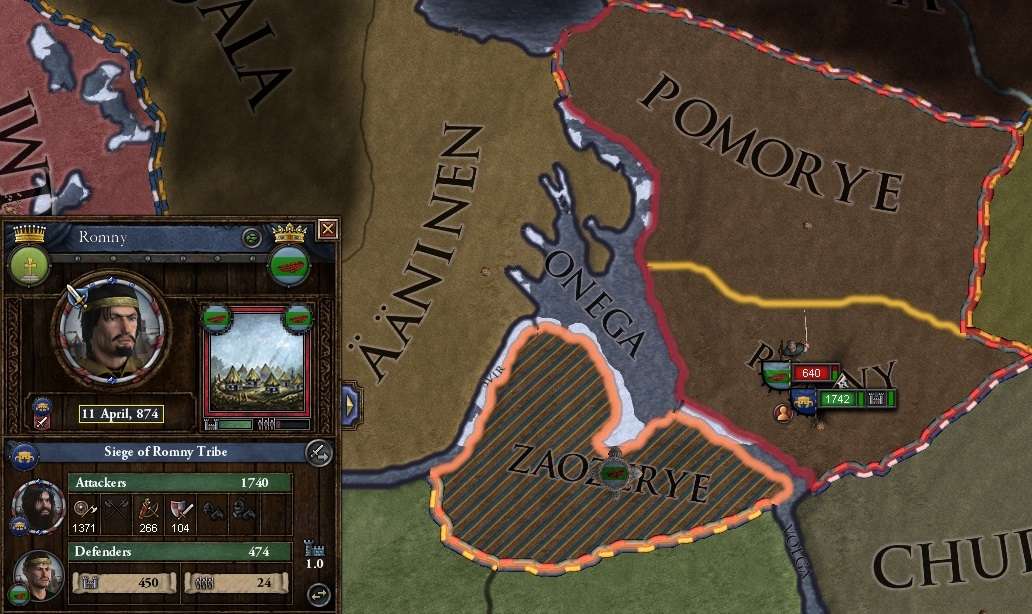

At least Hunter likes the weather!
Still Karhu refuses to give up. As April draws to a close, with the rivers and lakes still largely frozen, he sends Voitto on an apparently pointless march around Lake Onega, to the territory of his Finnish neighbour in Ääninen. Rurik thinks to himself: let them waste their energy trekking around the icy landscape! Karhu’s resistance is in its death throes.
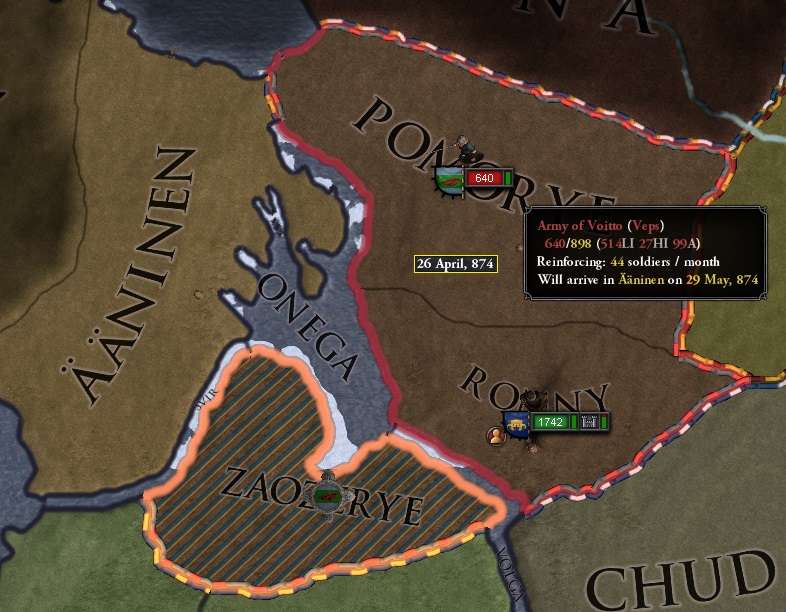
May 874
It’s about time! The continued occupation of his territory finally brings Karhu to his senses. The war is officialy won on 5 May 874.
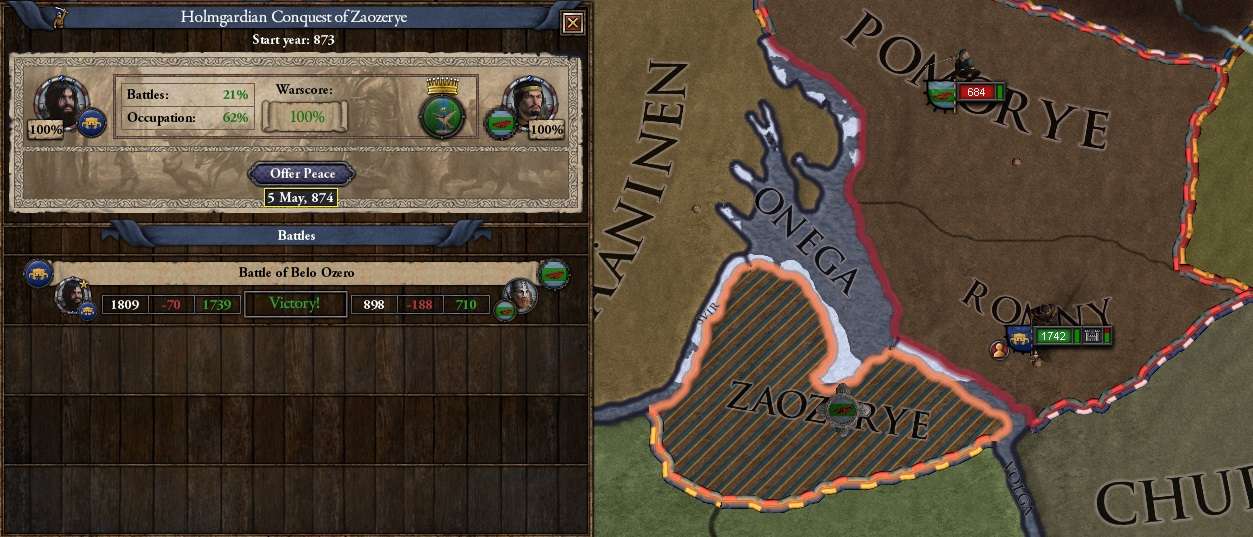
Rurik is merciful: he allows Karhu to live and to retain the rest of his Chiefdom.
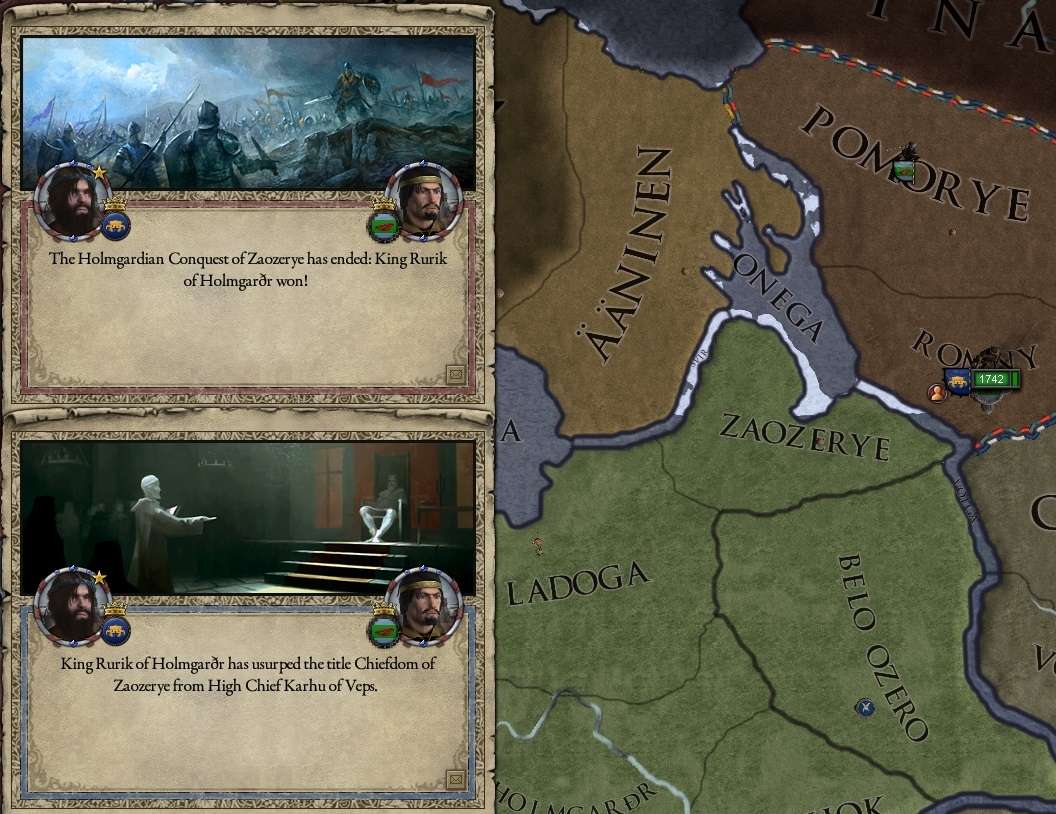
Rurik orders the dismissal of the levy. He now retains as many personal holdings (six) as he can without starting to offend his vassals. However, on dismissing the levy, he receives a report from Helgi about which he seeks more information.
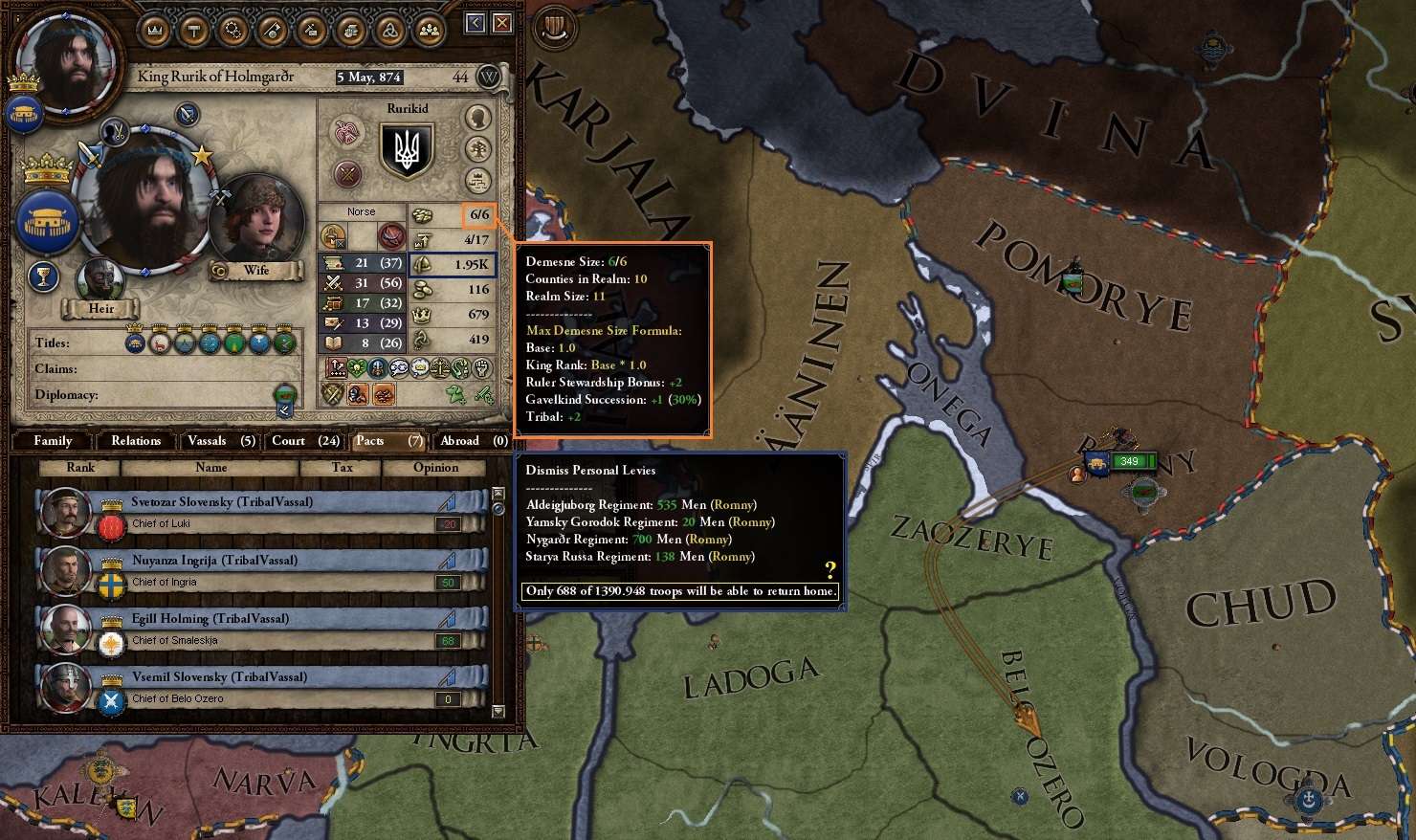
By 15 May Rurik is heading back to Belo Ozero to consider his next step: raid or subjugation; tribal army or not. There are now only 349 men left of his personal regiment, who have followed him through six years of war and raiding. And he notes his military strength estimate [as mentioned above in Q2] has dropped to 1,250. He seeks Helgi’s advice about what troops he will be able to count on for the next expedition and when, wherever it may be. Also of note, his infant son Dyre has now been made heir to the newly acquired Chiefdom of Zaozerye, presumably under the gavelkind succession rules of the realm.
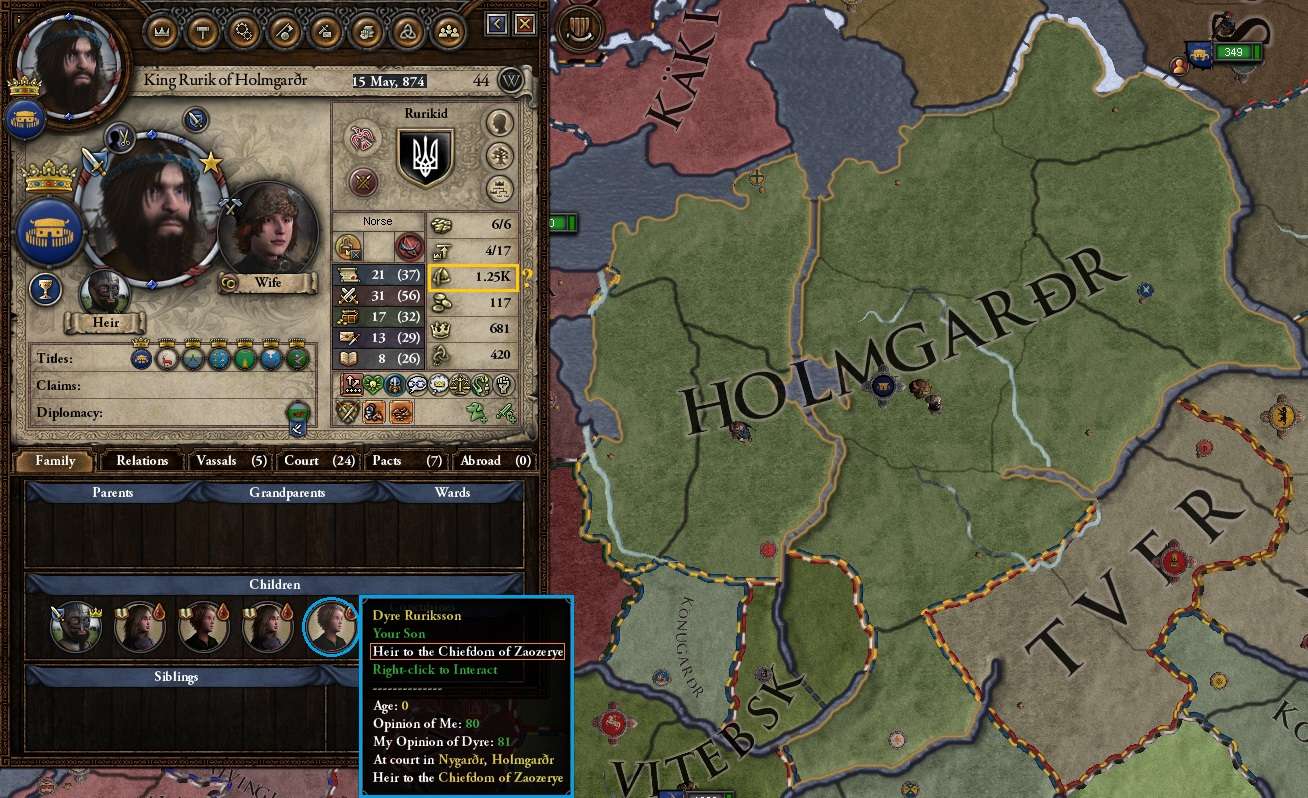
So ends Rurik’s War of Conquest for Zaozerye and, as is his wont, he will be looking to launch into his next adventure as soon as possible. The dream of Rus moves a little closer, his prestige remains high, the coffers are beginning to recover (but are still quite low after the difficult Pskov conquest) and there are now plenty of heirs to secure the dynasty (though that blessing may be mixed). But he has not yet decided what to do about Helgi and his heretical Slavic beliefs or the bigger question of the consolidation of the Norse holy sites and the reformation of the faith. These issues have been pushed off into the future for now but will inevitably come into view again.
Questions
Ch17 Q1: Plots. OK, I’ve read a bit in other AARs about plots, where some seem to ignore most of them, others track them, some try (as ruler) to stop selected ones and some even seek to auto-stop pretty much every such minor plot. Any views on the merits of different approaches? Is it best to stop them on general principles (unless it’s plot to get rid of someone who needs getting rid of, of course)? Perhaps on the basis of not depleting the court of possible talent? If you let them go at it, are there any adverse effects of such bloodletting in the margins? Conversely, are there benefits in running a tight ship and generally getting the courtiers to behave? Of course, a plot against a key character, family member, oneself, etc is an entirely different matter!
Ch17 Q2: Levy Dismissal. The message says “only 688 of 1,390.948 troops will be able to return home”. Also, in this screenshot the realm military strength is shown as 1.95k, whereas in the next it has been reduced to 1.25k. Can someone explain what this actually means? Is it standard after dismissing a levy? Have I made a mistake by dismissing it outside Holmgarðr’s borders (ie in Romny)? Is this a real loss and, if so, will it be made up again over time? Any explanation would be very useful, as it will figure into the next set of calculations for the proposed subjugation war on Chud (which might instead become a raid, unless the tribal army summons is issued).
Ch17 Q3: More on Gavelkind Succession. We have talked about various aspects of this before, including after the last chapter when discussing the implication of subjugation. So, both the second and third sons have now been made heirs to the two most recently acquired counties – Pskov and now Zaozerye. That’s not too bad, as they are both new and relatively weak. But is that all they get under the succession laws? There was mention before that if I create another Duchy/High Chiefdom for Rurik in the meantime (eg Pskov), or conquer one (eg Chud) in pursuit of the Rus claim, they might be passed out to subsequent sons as well. Is that right? Or do they just inherit the counties? Not having been through a gavelkind succession (or seen one written up in detail on an AAR yet), I have an idea of the general concept but not the specifics. And now there are three sons and maybe more in the future, plus the prospect of a number of subjugation wars over the next few years, I need to start factoring in the consequences of how those conquest should be made. Alas, converting away from gavelkind is, I suspect, too far off to prevent Rurik’s succession being prosecuted under it.
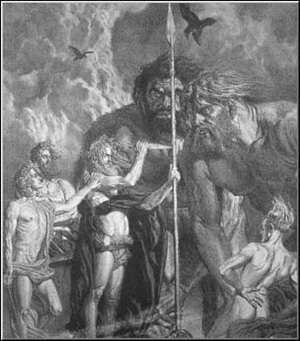
A couple of Jötnar look on in amazement: “Whoa, I see they call you ‘Mighty Thor’ for a reason!”
“Yes,” observes a rather scantily clad bystander, hand on hip and looking askance. “Keep that thing well away from me!”
“Hey, I want a closer look at that!” asks another (with flowing golden locks) breathlessly, while putting his hand on Thor’s shoulder.
“Keep your distance, Marmaduke, only I am allowed to handle this,” mutters Thor.
Thor is better known for his hammer, and Odin for his spear. But in this case, Thor demonstrates that his own spear is indeed mighty, and so hard you can try to stick a knife in it to no effect!
We resume the story with Rurik back in his seat of Nygarðr with the veterans of his remaining personal guard from January 867 [ie the original 676 event troops], contemplating whether to raid again or conquer for Rus, and if he should use much of his remaining prestige to call up a tribal army.
ᚔ ᚱᚢᚱᛁ ᚲᛁᛞ ᚔ
16 August 873
As Gumarich der Schreiber noted in his commentaries, no-one had long to wait.
The Konungr called a military council of war the evening he returned to his holding. As was his habit, orders were issued then feasting and wenching followed. He started marching the next day.
The King did proclaim to his commanders and officers: “We march first to Ladoga with the Regiment. Once in position to keep an eye on the border, I will send a challenge of war to Karhu of Veps. He will surrender Zaozerye to my rightful claim, for Rus and the glory of House Rurikid. Whether he also wishes the ground to be drenched in the blood of his soldiers will be his choice!”
Our sovereign's words were met with the traditional cheer, followed by traditional tearing apart of food, the tossing of scraps and bones to the dogs around the table – including his faithful hound Hunter, traditional drinking to the point of unconsciousness, then often incapable attempts by the men to force themselves on the womenfolk. Who were of course used to such traditional behaviour and were for the most part well aware of how to welcome or avoid it.
The King did proclaim to his commanders and officers: “We march first to Ladoga with the Regiment. Once in position to keep an eye on the border, I will send a challenge of war to Karhu of Veps. He will surrender Zaozerye to my rightful claim, for Rus and the glory of House Rurikid. Whether he also wishes the ground to be drenched in the blood of his soldiers will be his choice!”
Our sovereign's words were met with the traditional cheer, followed by traditional tearing apart of food, the tossing of scraps and bones to the dogs around the table – including his faithful hound Hunter, traditional drinking to the point of unconsciousness, then often incapable attempts by the men to force themselves on the womenfolk. Who were of course used to such traditional behaviour and were for the most part well aware of how to welcome or avoid it.

Plenty for all. "Here, Hunter!"
We know from her diary that young Edla was too unwell to attend either the celebratory feast or the king’s chamber that night. Perhaps mercifully, the dusty records do not reveal whether Rurik spent that night alone or not. There is always a chance that Queen Ingjerðr may have returned around this time for one of her periodic visits home, but that is unclear from the chronicle.
September 873
The month began with the arrival of Rurik and his personal regiment [ie those remaining original event troops] in Ladoga and the issue of a declaration of war to his northern neighbour, the Finn Karhu of Veps. The simple goal is the conquest of Zaozerye, part of the Rus claim.

The precaution of having the regiment in place was apposite: the enemy’s levies appeared instantly after the declaration. And of course, Rurik summoned his at the same time. For this small campaign, he simply planned to use his own demesne levies. The call for vassal levies and a possible tribal army would be contemplated later, if needed.

Perhaps Ingjerðr did return for a visit a little while earlier … we shall never know [ie. I’m not going to keep contriving elaborate narrative twists to explain these long-distance conjugal goings-on any more

With the Ladoga levy assembled, at reasonable levels and joined with the King’s Regiment, on 13 September Rurik orders a march on Zaozerye, where Karhu’s local commander Voitto immediately runs north to Romny. A wise move on his part.

27 September brings the news that key commander Sverker and his wife Bodil have had a son, named Sörkver. It is hoped he will grow up to be a strong Norse warrior! By the next day, the enemy have vacated Zaozerye, while Rurik is still at least ten days away.
October 873
Dan arrives in Ladoga on 7 October with the main Nygarðr Regiment levy (774 troops) from the home county of Holmgarðr. He is ordered to march straight on to Zaozerye, a good central point from which to view the enemy’s next moves (if any), while reducing their holding there. Rurik arrives in Zaozerye with the main-guard on 11 October, to find the gates of the tribal holding closed up and the fort entrusted to one of Karhu’s underlings. The siege commences - at least the recent improvement in siege warfare will help speed things along a little. To the north in Romny, Karhu has consolidated his own levy – it numbers 898, enough to earn a measure of respect but not to cause much concern. Unlike the nasty surprise received in Pskov a little while back!

The Nygarðr Regiment arrives in Zaozerye on 31 October, while Voitto takes the Veps army south to Chud, through which Rurik expects them to try to outflank him by crossing the Volga into Belo Ozero. Rurik simply waits for now, while the last of his demesne levies join him in Zaozerye.
“So, they’re scurrying through the territory of our neighbour to attack the women and children of Belo Ozero, eh?” Rurik was heard to remark. “I will not forget that soon. It would be better to have that Chief being more subservient to our interests, I think!”

November 873
As another northern winter approaches, the Veps army arrives in Chud on 23 November and, as expected, moves to cross the Volga and attack Belo Ozero. With the need to cross the river, Rurik’s scouts estimate he can get there six days before the enemy, which would put them at the tactical disadvantage. Either Voitta accepts the battle or pulls back, either of which would suit Rurik at this point. He wanted to conclude the siege of Zaozerye before offering decisive battle to Karhu’s forces: deflecting them from home soil for now is the preferred outcome. Helgi is given command of a contingent large enough to stop the Veps attackers (one way or the other), while Rurik remains with a smaller force to continue the siege.

Three days later, Voitto halts his attack and Helgi is likewise halted in Zaozerye, to once more assist with the siege.
December 873
In early December, a report is received from the Queen’s spy network (she continues her work in Constantinople for now). A new plot amongst the courtiers has been discovered. This adds to another reported earlier, about which nothing has been done as yet. Rurik is not sure whether he really needs to worry about these unless they concern someone of interest or value to him. Though perhaps he is missing something he should be paying attention to.


At least it’s a variation on the stab in the back. And if the expression of the victim is anything to go by, it doesn’t even hurt – just a minor irritation! It actually looks like some kind of attempted headache cure by a medieval ‘chirurgeon’: “Here you go, Sire, just relax, this won't hurt a bit. You may feel just a bit of a tickling sensation in your scalp.” "Oh, I say, that seems to be working, I can't feel anything any more ..."
Ch17 Q1: Plots. OK, I’ve read a bit in other AARs about plots, where some seem to ignore most of them, others track them, some try (as ruler) to stop selected ones and some even seek to auto-stop pretty much every such minor plot. Any views on the merits of different approaches? Is it best to stop them on general principles (unless it’s a plot to get rid of someone who needs getting rid of, of course)? Perhaps on the basis of not depleting the court of possible talent? If you let them go at it, are there any adverse effects on the realm of such bloodletting in the margins? Conversely, are there benefits in running a tight ship and generally getting the courtiers to behave? Of course, a plot against a key character, family member, oneself, etc is an entirely different matter!
As the depth of winter sets in and the land is blanketed with snow and ice, hygiene in the siege camp leaves much to be desired. Over 180 troops die of disease – a sore loss indeed.


Death dances among the miserable besiegers at Zaozerye in the winter of 873-74.
At this time, Chancellor Hrörekr and Steward Alfgeir come up with a suggestion: as an unintended Christmas present for the depleted coffers and a mercy for a young prisoner who has been held since the Britannia raid, it seems young Tanetbiu now has a monetary value to her father back in Devon. The offer of ransom is made to them by an envoy on the day of their heathen Cristes Maesse (the day is more familiar to Rurik's people as the Roman Saturnalia festival) and accepted (with unbefitting ill-grace) on the first day of the new year – the 874th or their false 'Lord'.

Even this early Anglo-Saxon word usage may be a bit anachronistic, as my hastily web-researched factoid claims it was first used some years later, even though the celebration itself predated this period by centuries:
And:
But I'm going to use it anyway, as Rurik was in Britain a few years before and it is an interaction with a Saxon lord of Devon. And because this is my alternate time line and I say so!
"Christians have been celebrating Jesus' birth on December 25 since at least the early fourth century. The first evidence of its observance is in Rome in 336 CE. The earliest Christians do not appear to have commemorated the nativity of Christ, but only the baptism and resurrection of Christ and the deaths of the martyrs. But as early as 273, Western Christians had decided on December 25 to celebrate the birth of Jesus. The December date for the holiday probably arose from a desire to provide an alternative to the Roman "birthday of the unconquered sun" and the Persian birthday of Mithras, both of which were celebrated on or around the winter solstice. A Christian writer explained in 320:
'We hold this day holy, not like the pagans because of the birth of the sun, but because of him who made it'." http://www.religionfacts.com/Christmas
And:
"The word for Christmas in late Old English is Cristes Maesse, the Mass of Christ, first found in 1038, and Cristes-messe, in 1131." http://www.newadvent.org/cathen/03724b.htm
But I'm going to use it anyway, as Rurik was in Britain a few years before and it is an interaction with a Saxon lord of Devon. And because this is my alternate time line and I say so!
31 December finally brought the fall of the Zaozerye tribal holding [bringing the war score to a healthy 62%]. But more will be required to make Karhu submit. The siege ended up costing 185 soldiers due to disease and another 44 are detailed to garrison the holding. This prompts Karhu’s commander Voitto to again march on Belo Ozero, perhaps for revenge, or at least to take the fight to the Holmgarðians. This time, Rurik sits tight, allowing them to proceed: it now suits his purposes to offer open battle, in the hope of winning a victory in the field to show Karhu the futility of further resistance.

January 874
Voitto’s modest army makes it to Belo Ozero on 24 January. Rurik issues new orders now the enemy is in place and ready for the taking:
Men, this is our chance to bloody our axes once again! I will personally sink Hálsbitr [‘Neckbiter’, his +2 battle-axe found during the raid on Devon a few years before] into as many Finnish necks as I can find. It will drink its full measure of blood!
We must brave the winter snows and fall upon our hapless enemy. They will regret setting foot on Holmgarðian soil – for the short time they will have left alive to contemplate their Chief’s folly in not ceding Zaozerye quickly to its rightful owner!
We must brave the winter snows and fall upon our hapless enemy. They will regret setting foot on Holmgarðian soil – for the short time they will have left alive to contemplate their Chief’s folly in not ceding Zaozerye quickly to its rightful owner!

He continues in a lower voice, to his commanders.
Helgi, Sverker, you will command the wings. We will fall on Voitto with our full strength. It will be a punishing winter march, but we march through our own country. It will not be pleasant for the enemy as they try to reduce Vsemil’s keep. This is a chance to bring the end of the war a lot closer. Their blood will feed Vsemil’s next harvest after the spring melt!
February 874
The Battle of Belo Ozero began on 11 February with the usual opening exchange of archery. As the battle wore on, the centre saw the hardest fighting and took the heaviest casualties, Rurik coming up against the strongest enemy division. They returned to exchanges of archery while the two wings then closed on their opposites to melee. "They are close to breaking!”, shouted Rurik, covered in the blood of his enemies and laying about him with Hálsbitr. “Send messages to Helgi and Sverker – press now and we will have them!"

Rurik, Hálsbitr in hand, exhorts his troops onward through the snows at the Battle of Belo Ozero.
Press forward they did and by 27 February the enemy were indeed broken and in full retreat.

March 874
Victory was marked on 6 March, with the enemy suffering heavy but not fatal casualties. The war was almost won, but still Karhu refused to give up. Very well, he would be forced to yield. Voitto flees back to Zaozerye and will be pursued, with Rurik hot on his heels.

After arriving in Zaozerye, Voitto heads straight back to his starting point in Romny. Rurik gave chase, confident they will not have sufficient time to rally from their rout to make a defence there along the icy banks of the Volga. He is now just one day behind them.

April 874
“By Thor’s Mighty Member!” [Ed Note: we must be true to the original source. This was the polite translation!  ] shouted Rurik in some frustration as he received yet another dismissive response from his adversary. “Will he not surrender yet? If I must burn every settlement in his dominion, I will have him bow his head.”
] shouted Rurik in some frustration as he received yet another dismissive response from his adversary. “Will he not surrender yet? If I must burn every settlement in his dominion, I will have him bow his head.”
“My Konungr, his resolve is only holding on by a thread. If we keep pressing, he will give in.”
“Very well, Sverker, we have no other choice, as I doubt he will offer open battle again unless at the last desperate gasp – and I don’t want to waste my time on that. We will press on to Romny and see what unfolds.”
“My Konungr, his resolve is only holding on by a thread. If we keep pressing, he will give in.”
“Very well, Sverker, we have no other choice, as I doubt he will offer open battle again unless at the last desperate gasp – and I don’t want to waste my time on that. We will press on to Romny and see what unfolds.”

Another message, more welcome, arrives in his dispatches from Nygarðr. Another son! What Helgi makes of all this, and the implications for the gavelkind succession, remains unclear for now – certainly to Rurik. He is more concerned about the present. And probably considers himself immortal, or at least with many more years to come.

This makes Helgi as heir, plus two sons and two daughters by Ingjerðr. A growing brood to secure the dynasty - and possibly divide the realm in the future!
And Hrörekr sends a message that may have no direct or immediate import for the frozen lands of the north – but sounds like good news if it means members of this particular branch of those Abrahamic infidels now have more chance of fighting each other!

The tracks of the remaining Veps army are still fresh in the snow, heading north to Pomorye, as Rurik arrives in Romny on 11 April.
“Let them run like the beaten curs they are,” Rurik announced. “We will besiege this holding until we take it or Karhu submits. I’m done chasing them around. Either way, we win.”


At least Hunter likes the weather!
Still Karhu refuses to give up. As April draws to a close, with the rivers and lakes still largely frozen, he sends Voitto on an apparently pointless march around Lake Onega, to the territory of his Finnish neighbour in Ääninen. Rurik thinks to himself: let them waste their energy trekking around the icy landscape! Karhu’s resistance is in its death throes.

May 874
It’s about time! The continued occupation of his territory finally brings Karhu to his senses. The war is officialy won on 5 May 874.

Rurik is merciful: he allows Karhu to live and to retain the rest of his Chiefdom.
“The fool. All I ever wanted was to reclaim what rightfully belongs to Rus and the Rurikid Dynasty. Now, let us be gone from this benighted backwater!” Rurik nodded to Helgi and with that, they were on their way home.

ᚔ ᚱᚢᚱᛁ ᚲᛁᛞ ᚔ
Rurik orders the dismissal of the levy. He now retains as many personal holdings (six) as he can without starting to offend his vassals. However, on dismissing the levy, he receives a report from Helgi about which he seeks more information.

Ch17 Q2: Levy Dismissal. The message says “only 688 of 1,390.948 troops will be able to return home”. Also, in this screenshot the realm military strength is shown as 1.95k, whereas in the next it has been reduced to 1.25k. Can someone explain what this actually means? Is it standard after dismissing a levy? Have I made a mistake by dismissing it outside Holmgarðr’s borders (ie in Romny)? Is this a real loss and, if so, will it be made up again over time? Any explanation would be very useful, as it will figure into the next set of calculations for the proposed subjugation war on Chud (which might instead become a raid, unless the tribal army summons is issued).
By 15 May Rurik is heading back to Belo Ozero to consider his next step: raid or subjugation; tribal army or not. There are now only 349 men left of his personal regiment, who have followed him through six years of war and raiding. And he notes his military strength estimate [as mentioned above in Q2] has dropped to 1,250. He seeks Helgi’s advice about what troops he will be able to count on for the next expedition and when, wherever it may be. Also of note, his infant son Dyre has now been made heir to the newly acquired Chiefdom of Zaozerye, presumably under the gavelkind succession rules of the realm.

Ch17 Q3: More on Gavelkind Succession. We have talked about various aspects of this before, including after the last chapter when discussing the implication of subjugation. So, both the second and third sons have now been made heirs to the two most recently acquired counties – Pskov and now Zaozerye. That’s not too bad, as they are both new and relatively weak. But is that all they get under the succession laws? There was mention before that if I create another Duchy/High Chiefdom for Rurik in the meantime (eg Pskov), or conquer one (eg Chud) in pursuit of the Rus claim, they might be passed out to subsequent sons as well. Is that right? Or do they just inherit the counties? Not having been through a gavelkind succession (or seen one written up in detail on an AAR yet), I have an idea of the general concept but not the specifics. And now there are three sons and maybe more in the future, plus the prospect of a number of subjugation wars over the next few years, I need to start factoring in the consequences of how those conquest should be made. Alas, converting away from gavelkind is, I suspect, too far off to prevent Rurik’s succession being prosecuted under it.
ᚔ ᚱᚢᚱᛁ ᚲᛁᛞ ᚔ
So ends Rurik’s War of Conquest for Zaozerye and, as is his wont, he will be looking to launch into his next adventure as soon as possible. The dream of Rus moves a little closer, his prestige remains high, the coffers are beginning to recover (but are still quite low after the difficult Pskov conquest) and there are now plenty of heirs to secure the dynasty (though that blessing may be mixed). But he has not yet decided what to do about Helgi and his heretical Slavic beliefs or the bigger question of the consolidation of the Norse holy sites and the reformation of the faith. These issues have been pushed off into the future for now but will inevitably come into view again.
ᚔ ᚱᚢᚱᛁ ᚲᛁᛞ ᚔ
Questions
Ch17 Q1: Plots. OK, I’ve read a bit in other AARs about plots, where some seem to ignore most of them, others track them, some try (as ruler) to stop selected ones and some even seek to auto-stop pretty much every such minor plot. Any views on the merits of different approaches? Is it best to stop them on general principles (unless it’s plot to get rid of someone who needs getting rid of, of course)? Perhaps on the basis of not depleting the court of possible talent? If you let them go at it, are there any adverse effects of such bloodletting in the margins? Conversely, are there benefits in running a tight ship and generally getting the courtiers to behave? Of course, a plot against a key character, family member, oneself, etc is an entirely different matter!
Ch17 Q2: Levy Dismissal. The message says “only 688 of 1,390.948 troops will be able to return home”. Also, in this screenshot the realm military strength is shown as 1.95k, whereas in the next it has been reduced to 1.25k. Can someone explain what this actually means? Is it standard after dismissing a levy? Have I made a mistake by dismissing it outside Holmgarðr’s borders (ie in Romny)? Is this a real loss and, if so, will it be made up again over time? Any explanation would be very useful, as it will figure into the next set of calculations for the proposed subjugation war on Chud (which might instead become a raid, unless the tribal army summons is issued).
Ch17 Q3: More on Gavelkind Succession. We have talked about various aspects of this before, including after the last chapter when discussing the implication of subjugation. So, both the second and third sons have now been made heirs to the two most recently acquired counties – Pskov and now Zaozerye. That’s not too bad, as they are both new and relatively weak. But is that all they get under the succession laws? There was mention before that if I create another Duchy/High Chiefdom for Rurik in the meantime (eg Pskov), or conquer one (eg Chud) in pursuit of the Rus claim, they might be passed out to subsequent sons as well. Is that right? Or do they just inherit the counties? Not having been through a gavelkind succession (or seen one written up in detail on an AAR yet), I have an idea of the general concept but not the specifics. And now there are three sons and maybe more in the future, plus the prospect of a number of subjugation wars over the next few years, I need to start factoring in the consequences of how those conquest should be made. Alas, converting away from gavelkind is, I suspect, too far off to prevent Rurik’s succession being prosecuted under it.
ᚔ ᚱᚢᚱᛁ ᚲᛁᛞ ᚔ
Thor’s Mighty Spear

A couple of Jötnar look on in amazement: “Whoa, I see they call you ‘Mighty Thor’ for a reason!”
“Yes,” observes a rather scantily clad bystander, hand on hip and looking askance. “Keep that thing well away from me!”
“Hey, I want a closer look at that!” asks another (with flowing golden locks) breathlessly, while putting his hand on Thor’s shoulder.
“Keep your distance, Marmaduke, only I am allowed to handle this,” mutters Thor.
Thor is better known for his hammer, and Odin for his spear. But in this case, Thor demonstrates that his own spear is indeed mighty, and so hard you can try to stick a knife in it to no effect!
Last edited:




